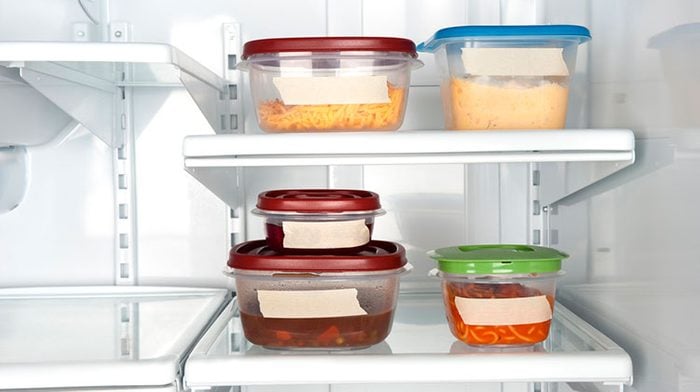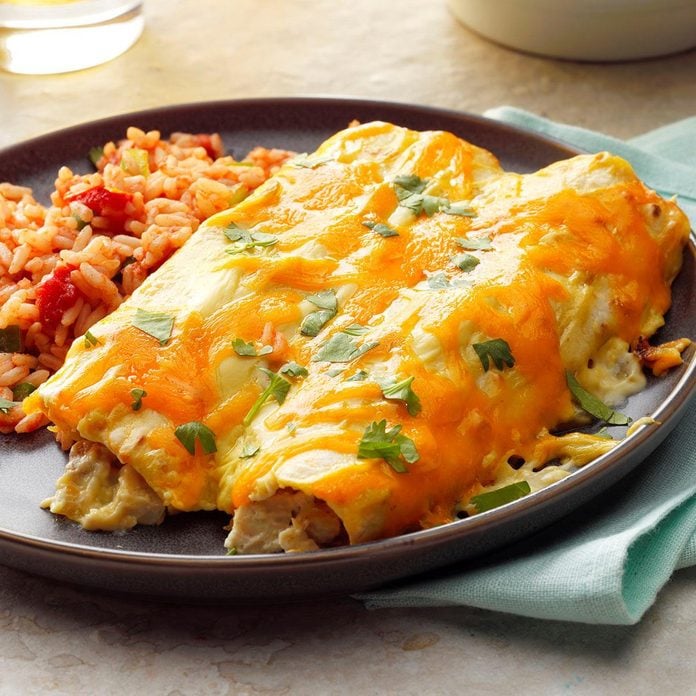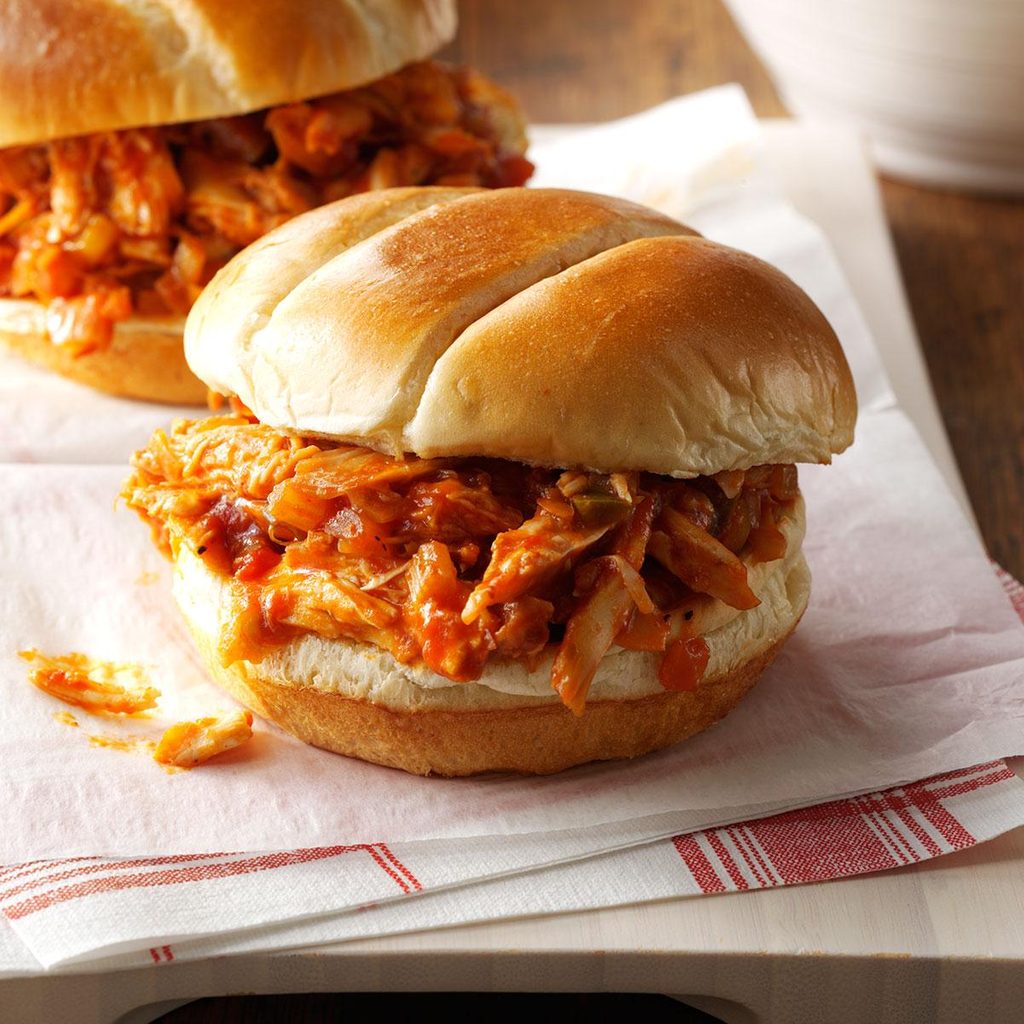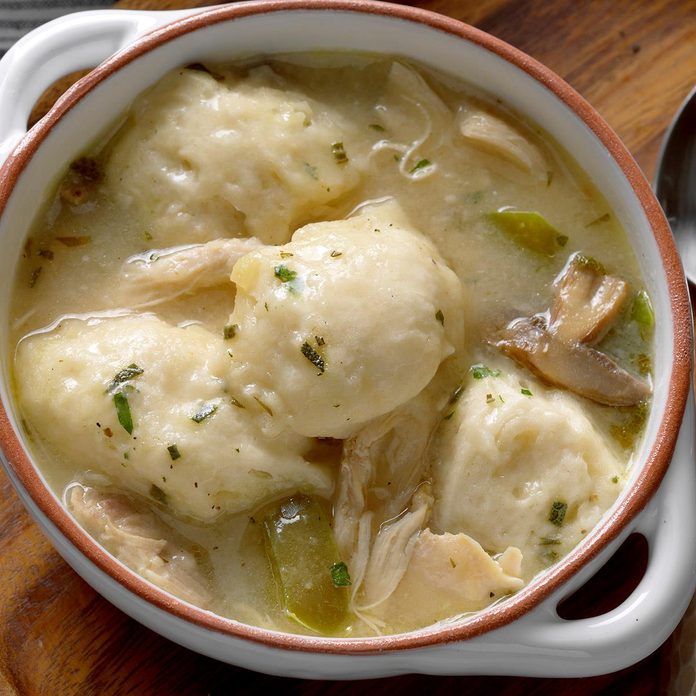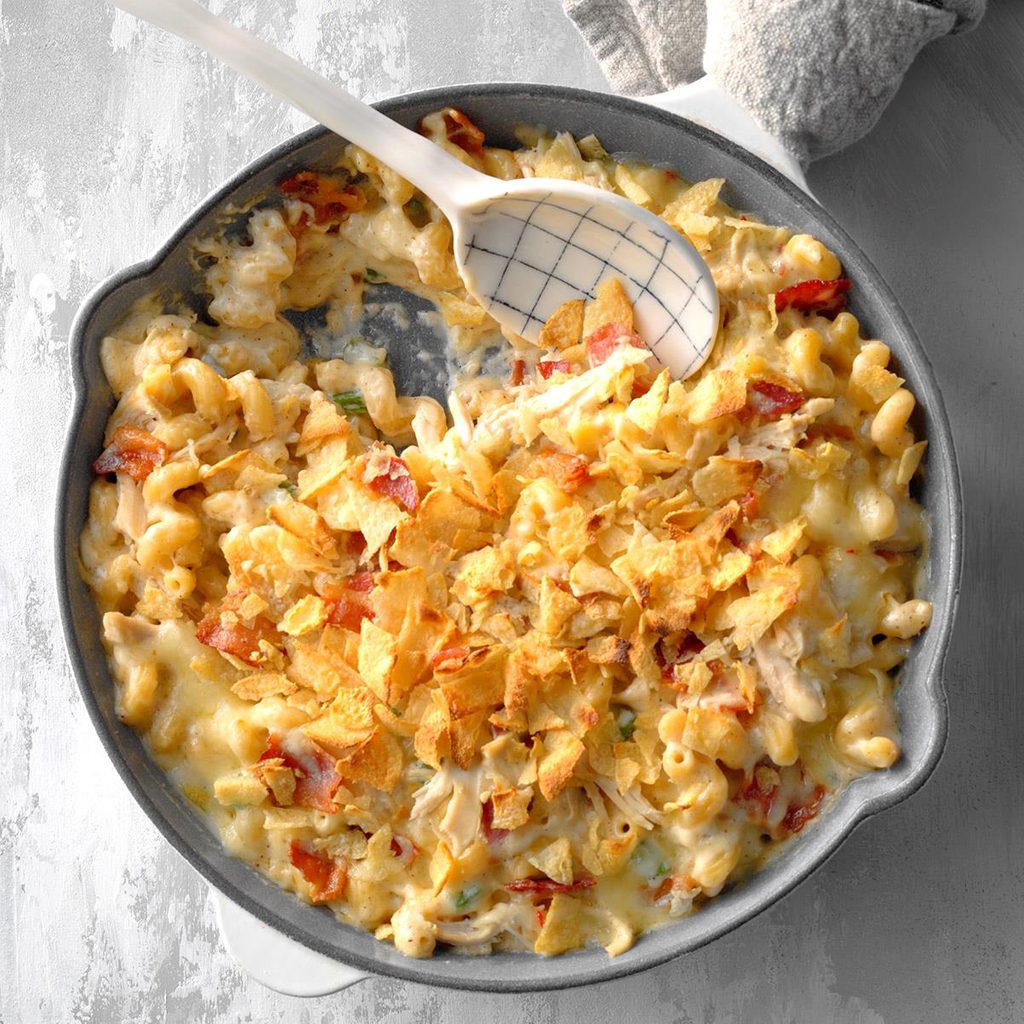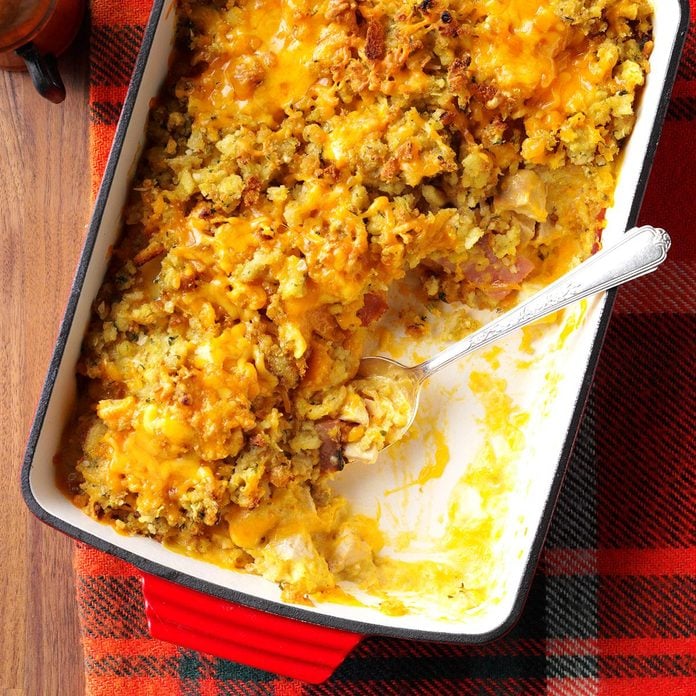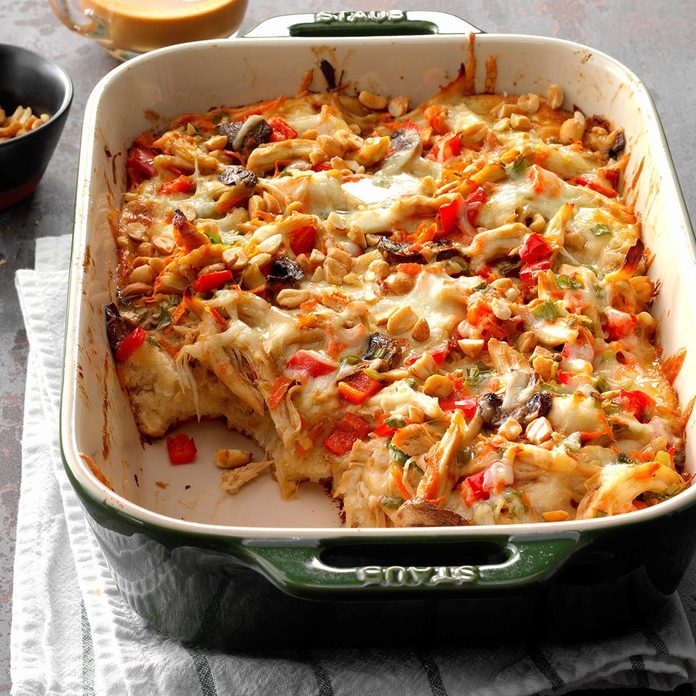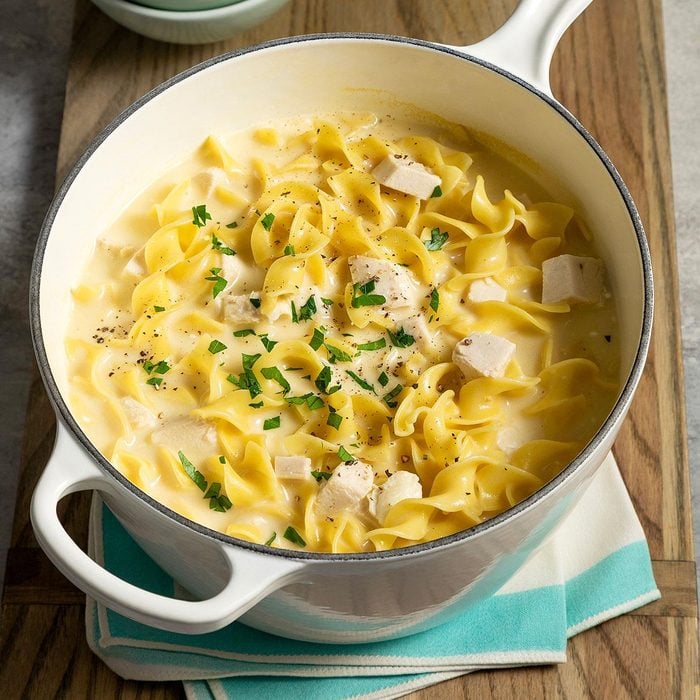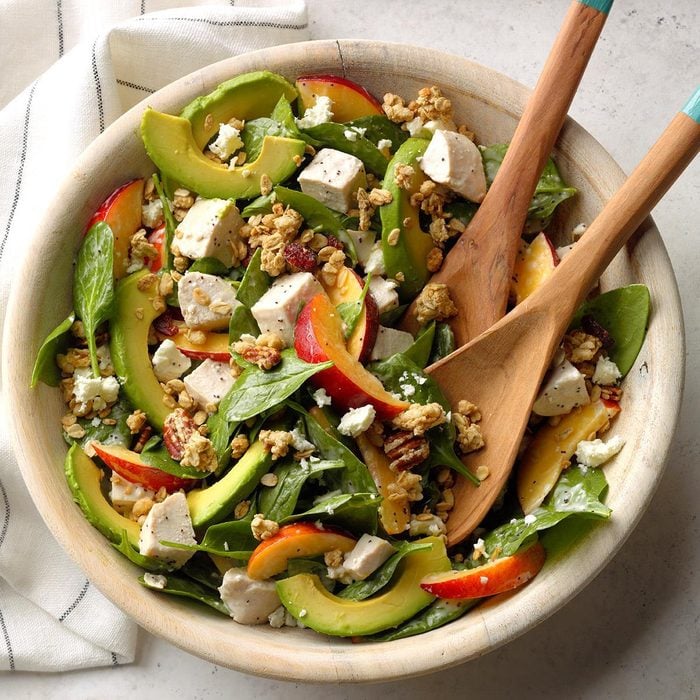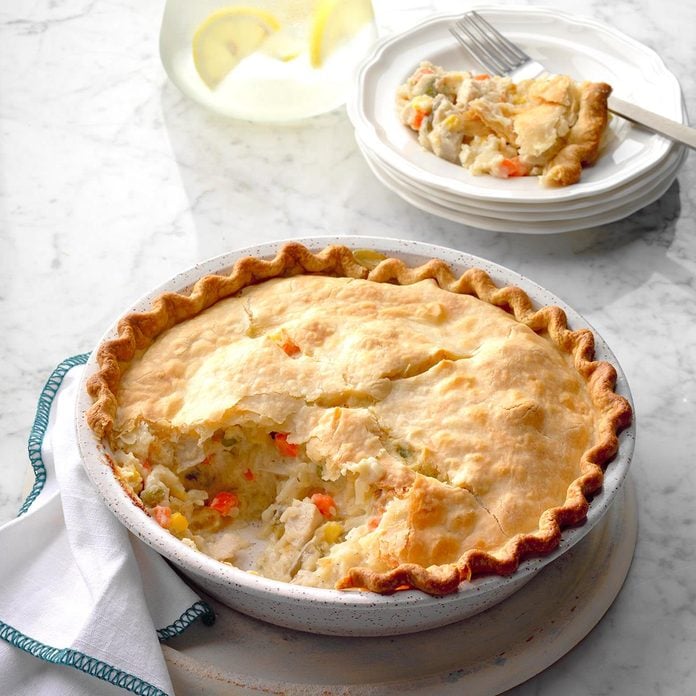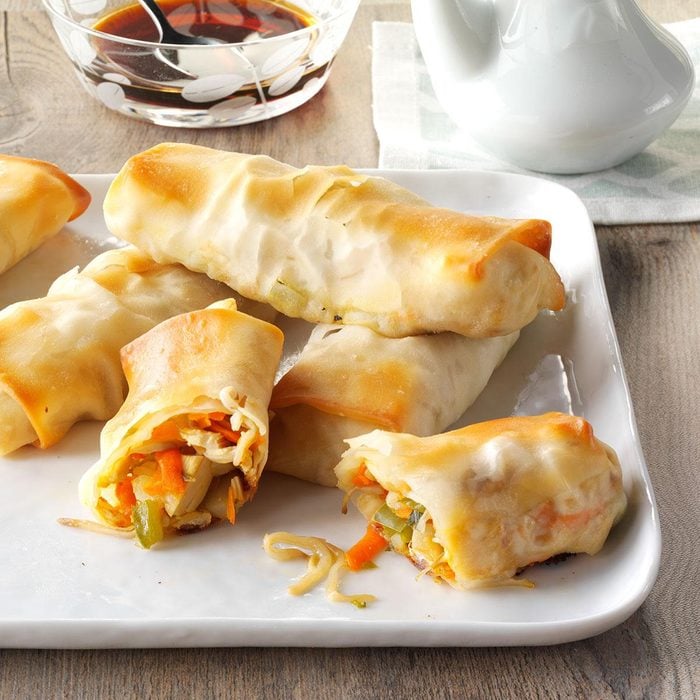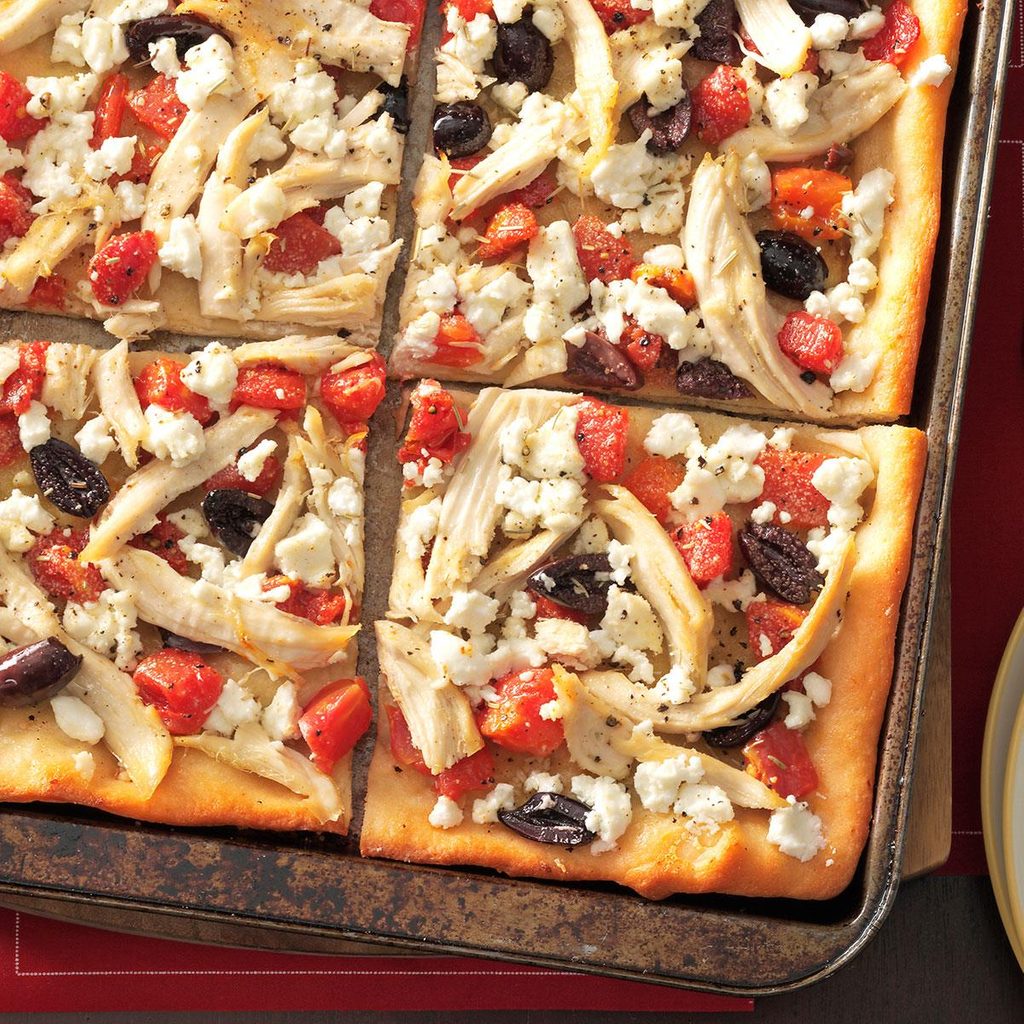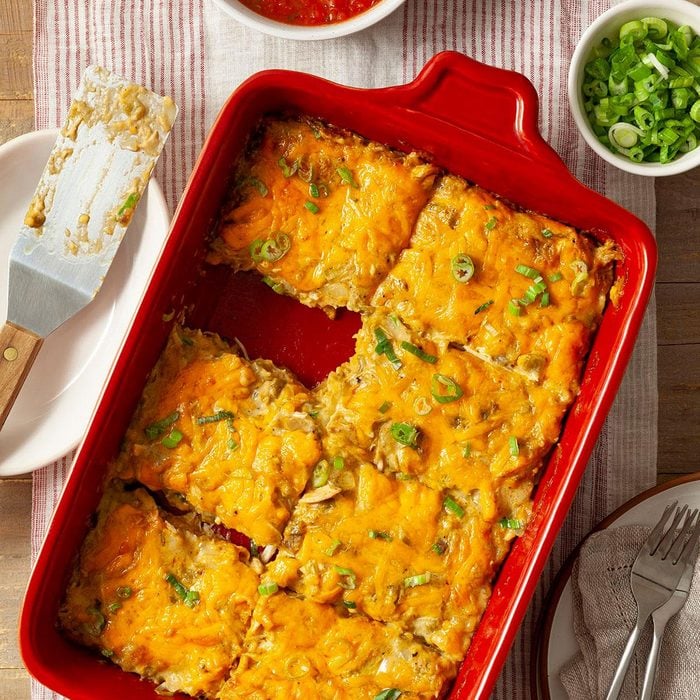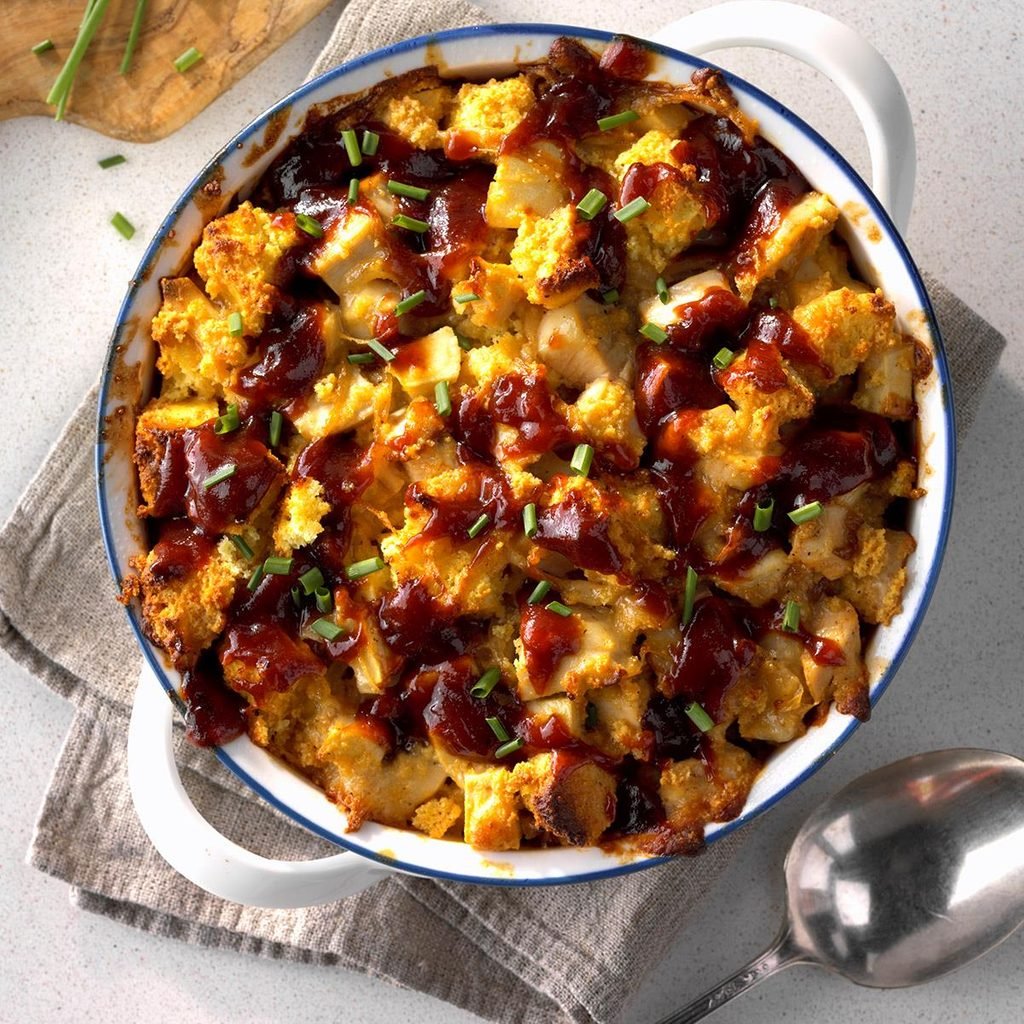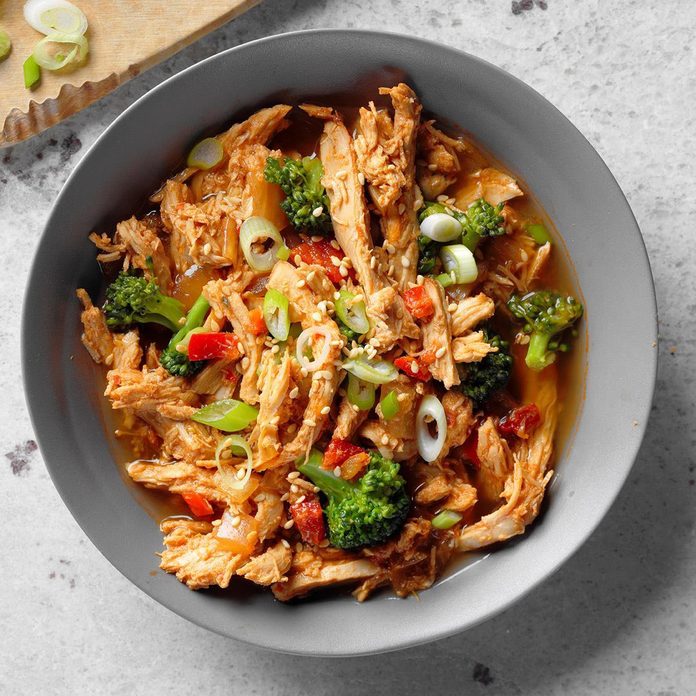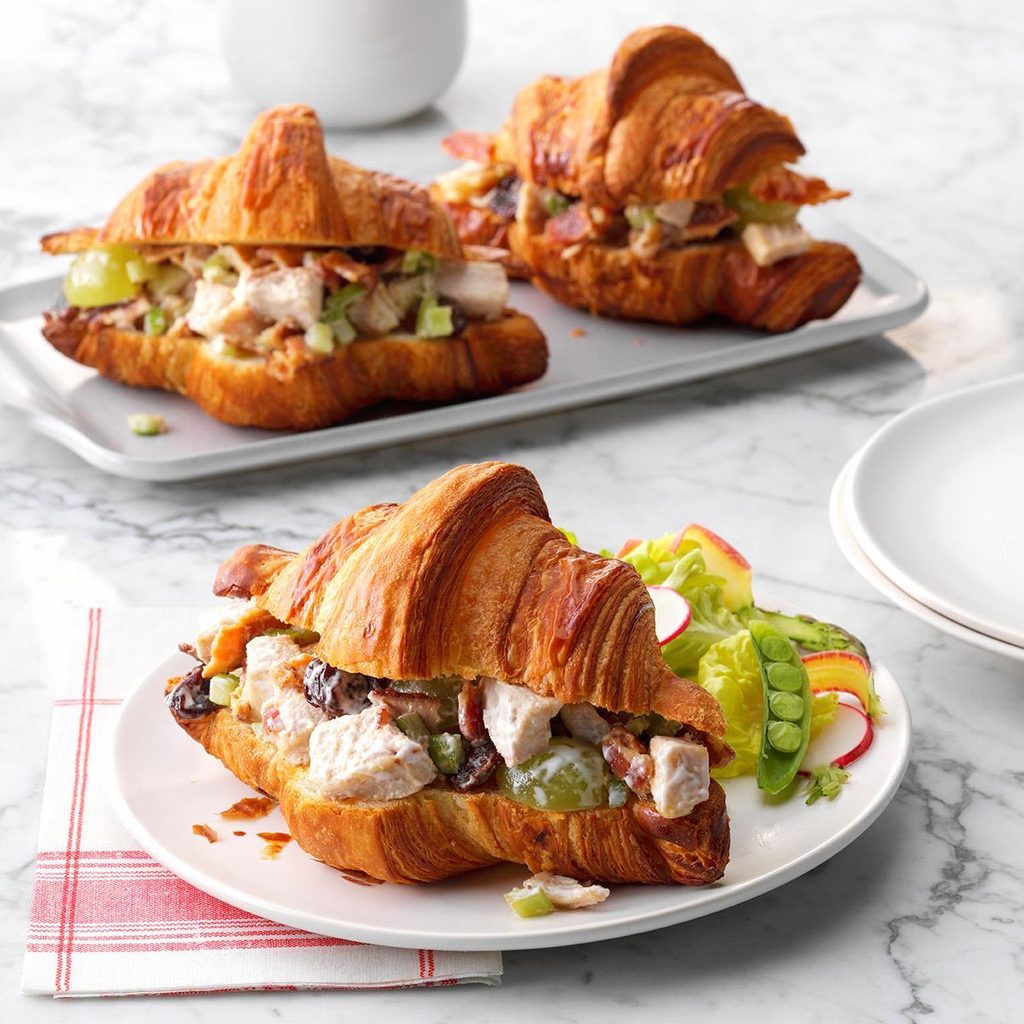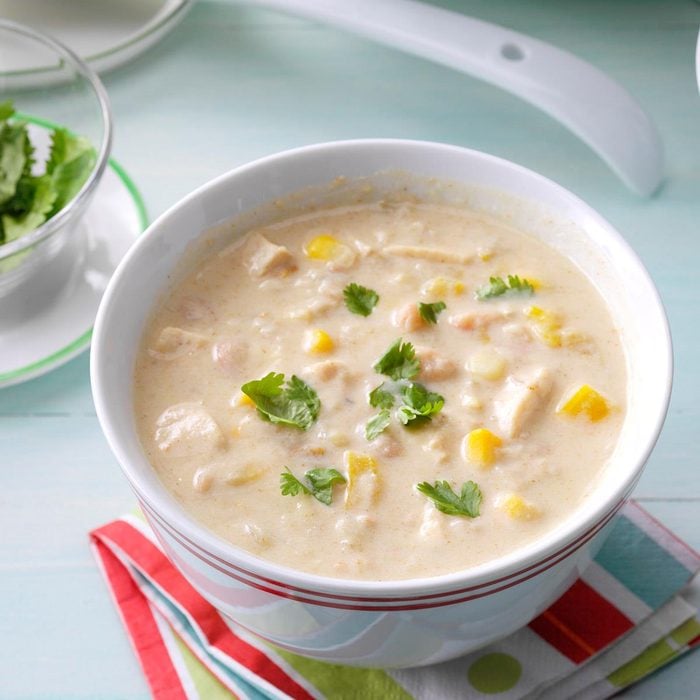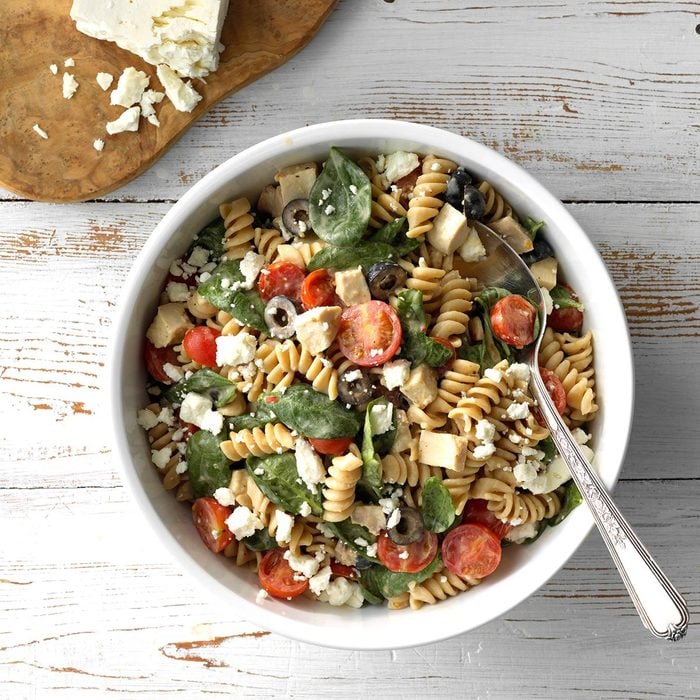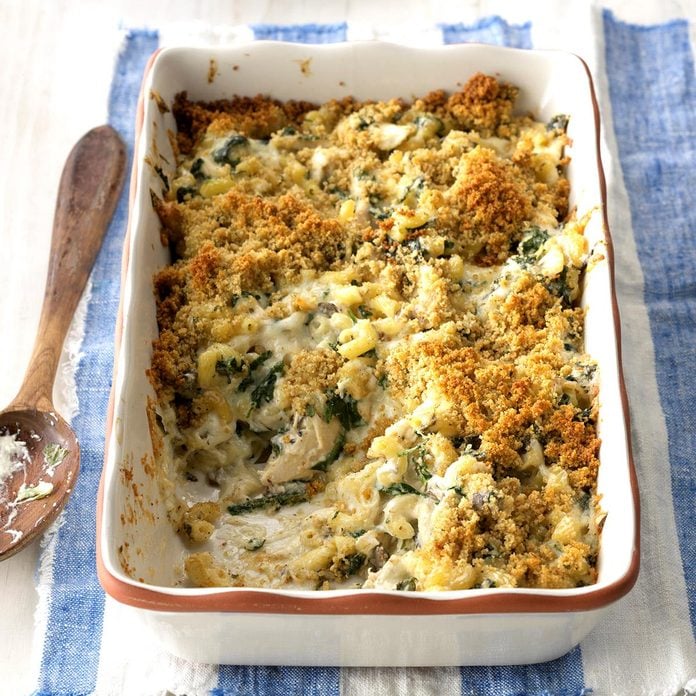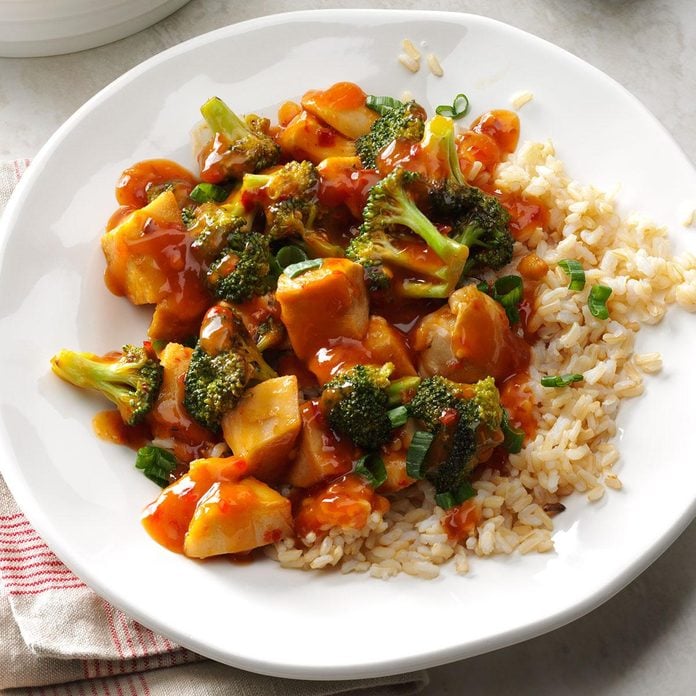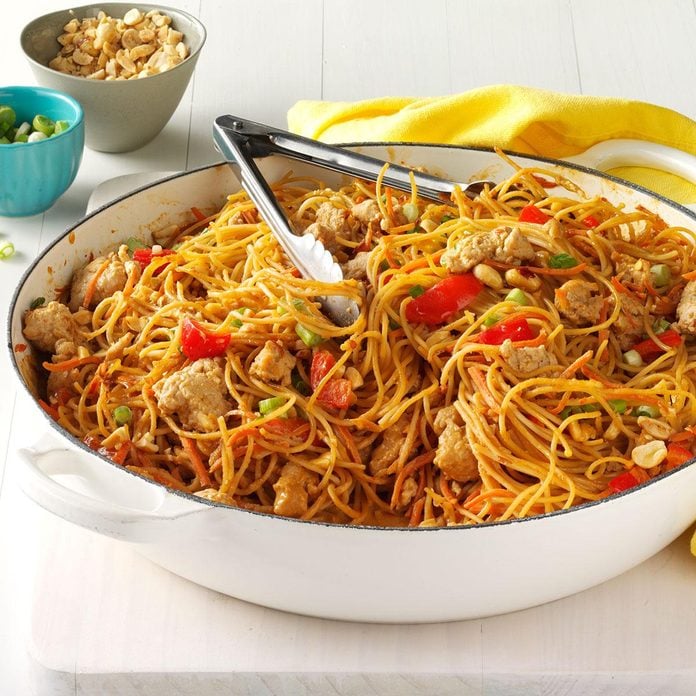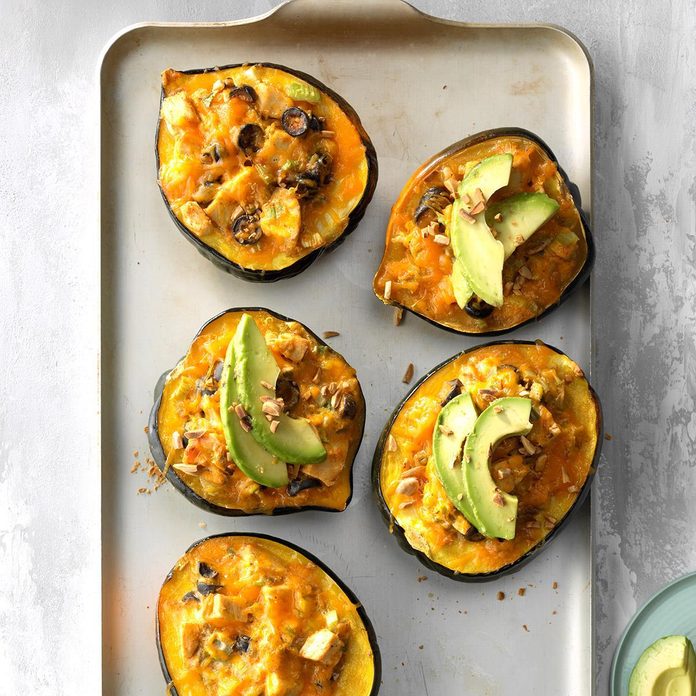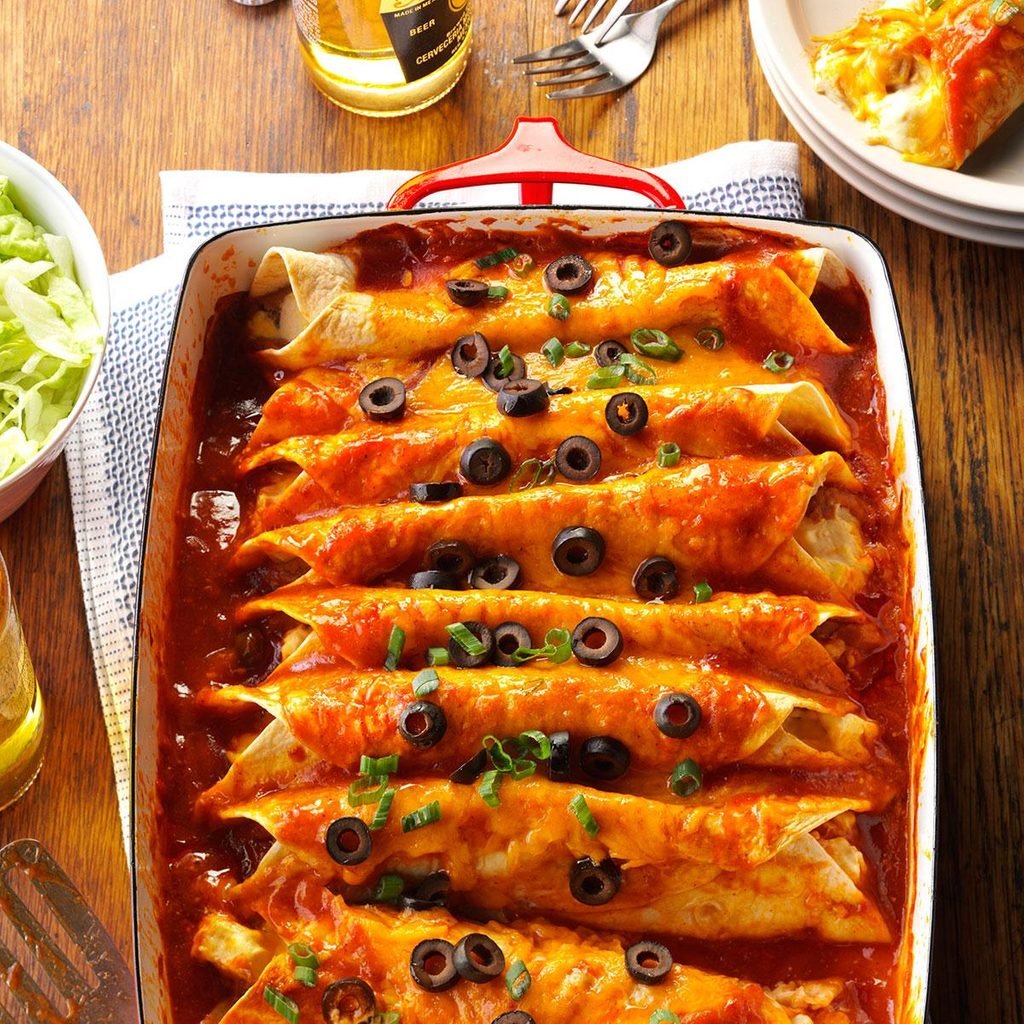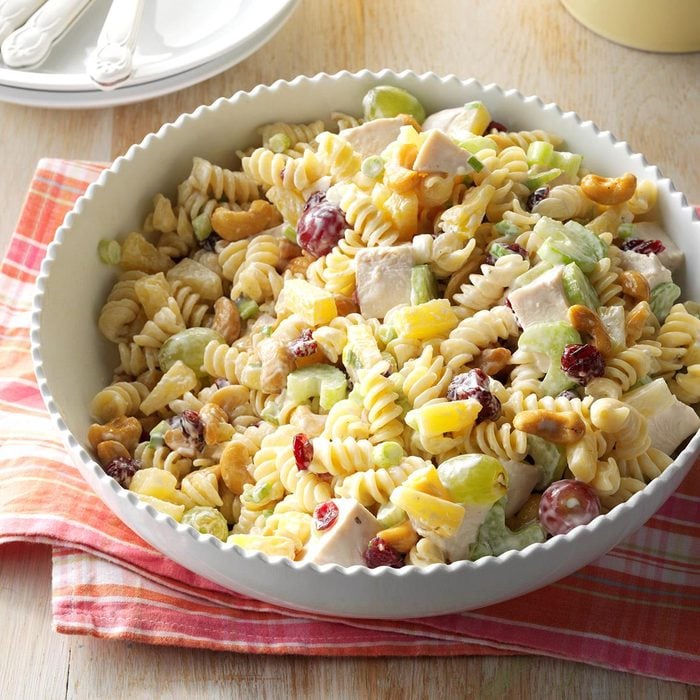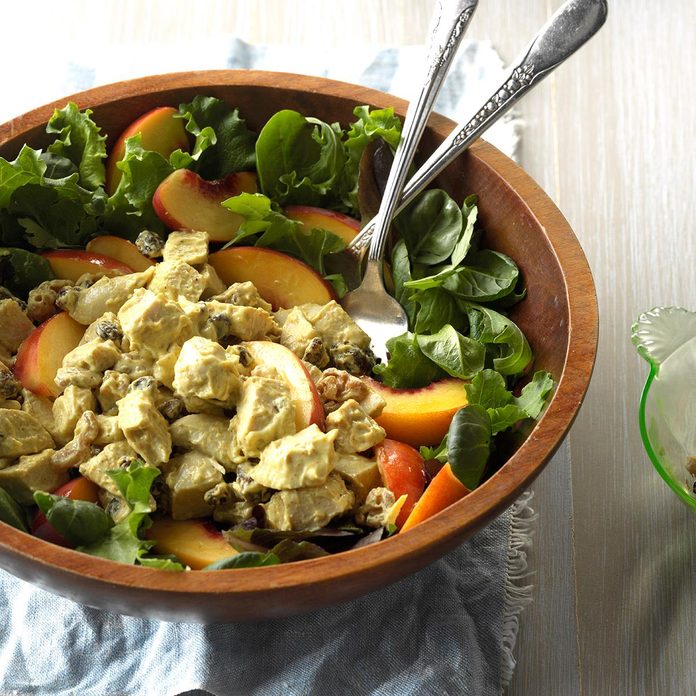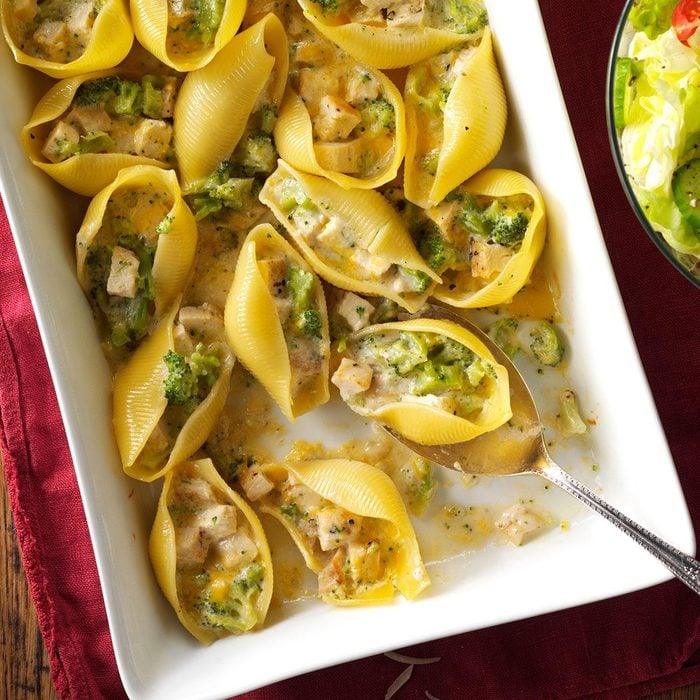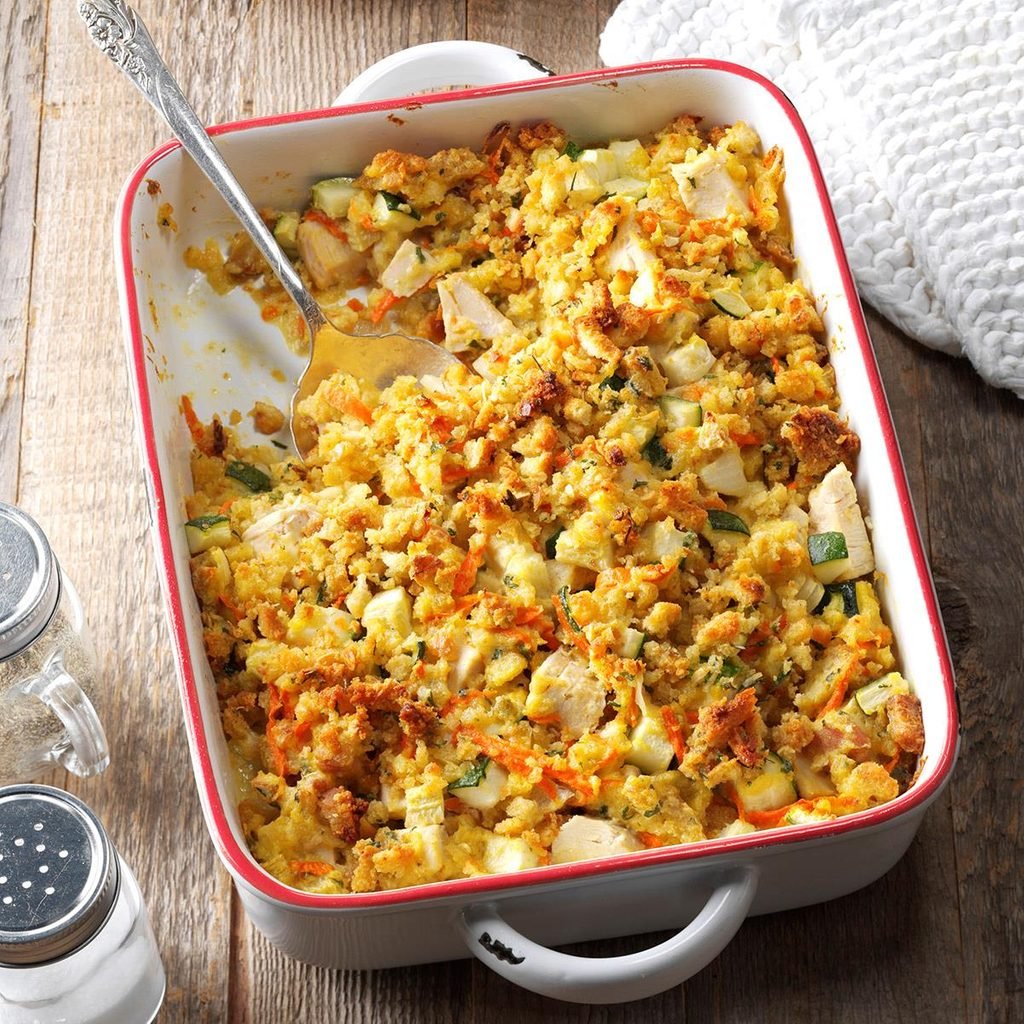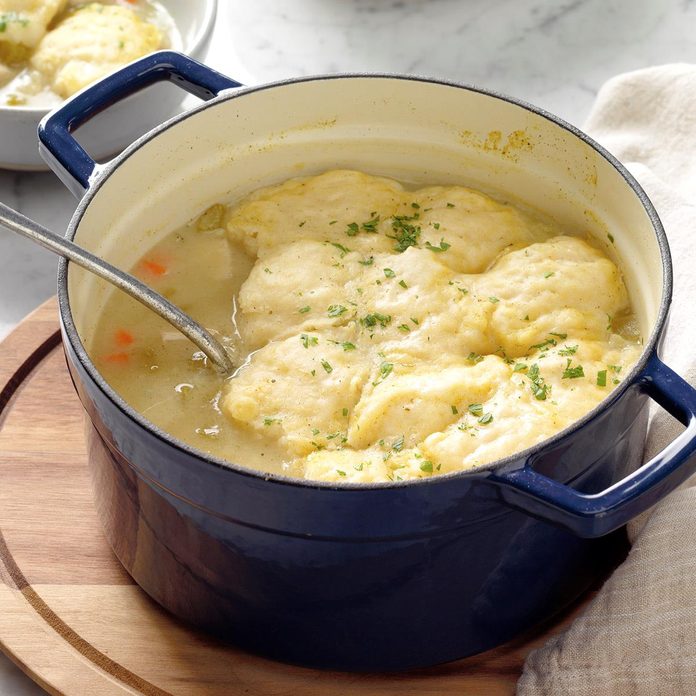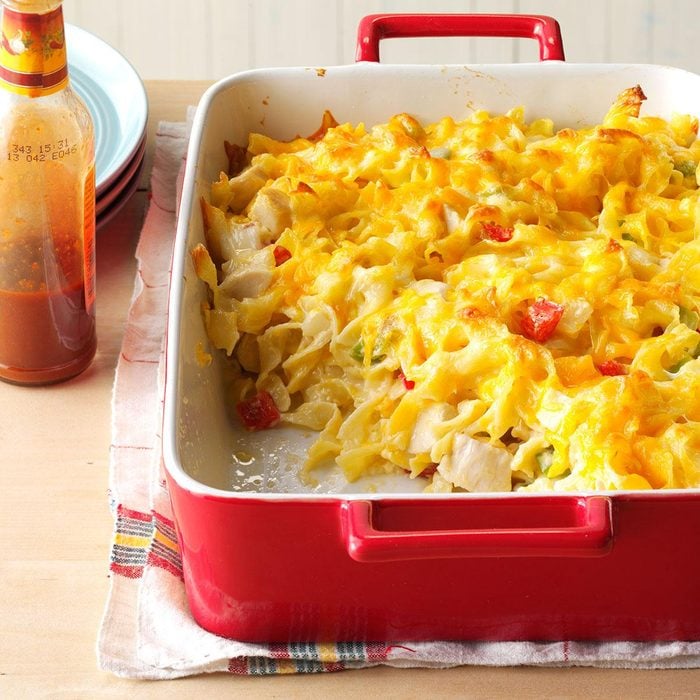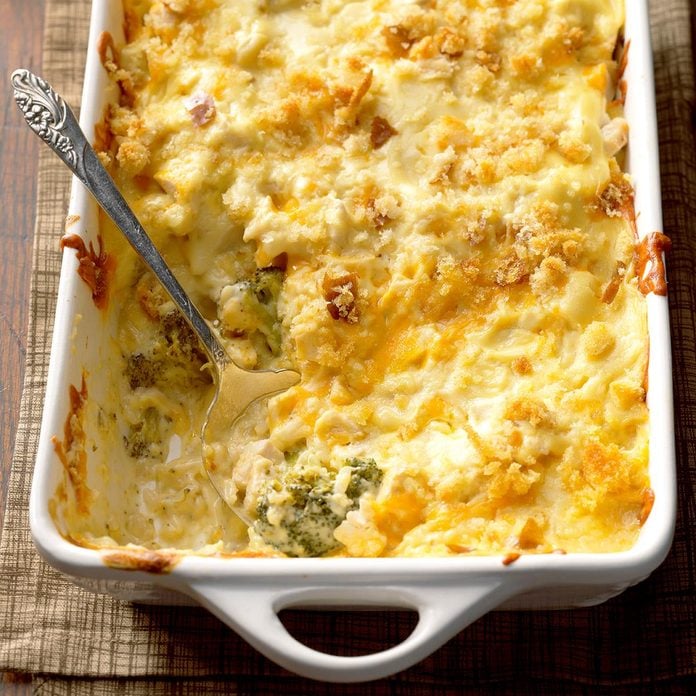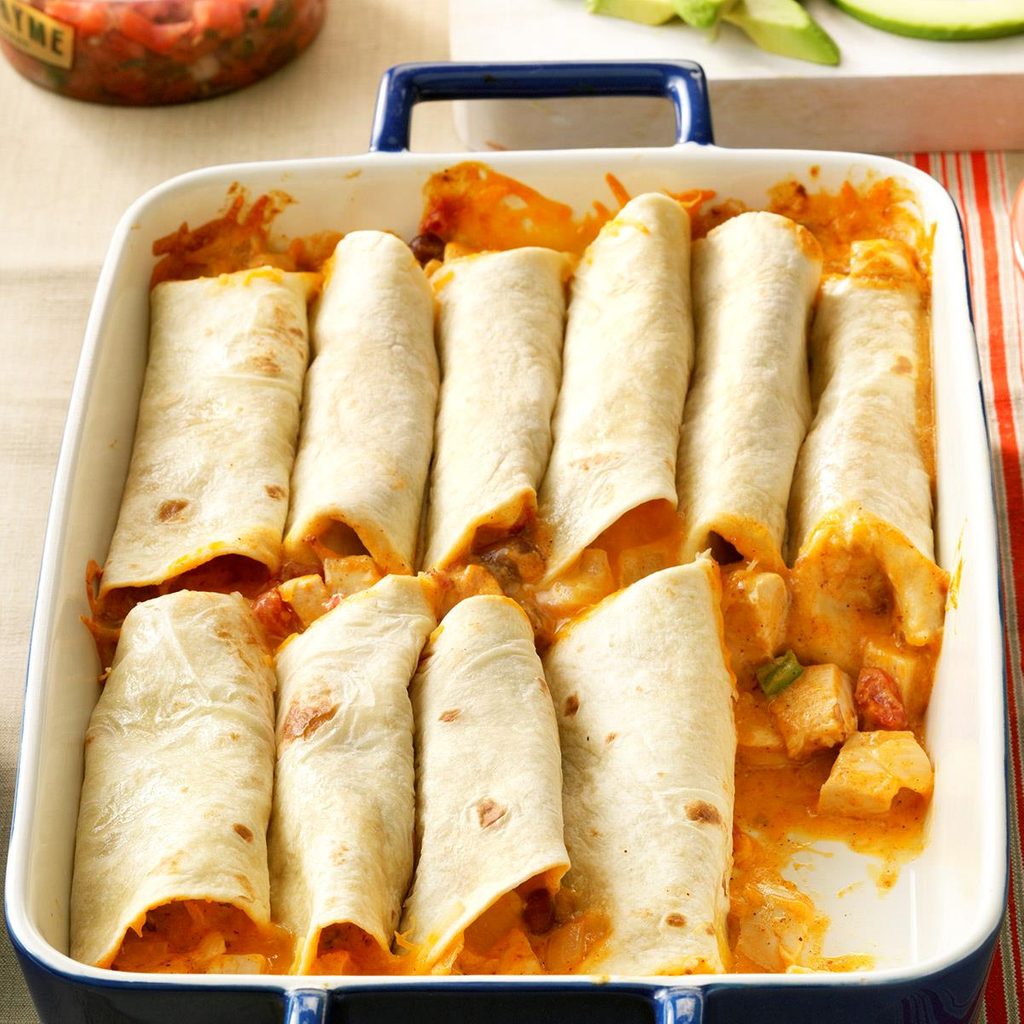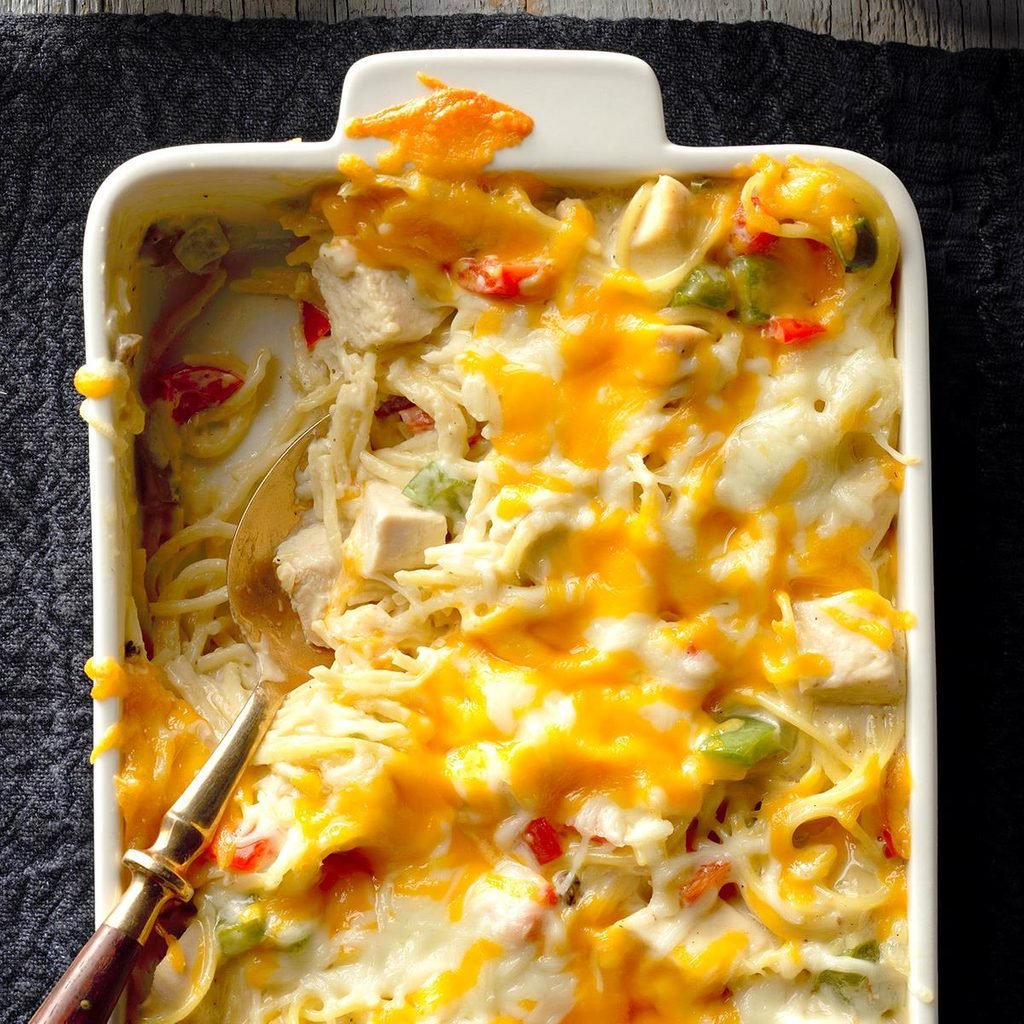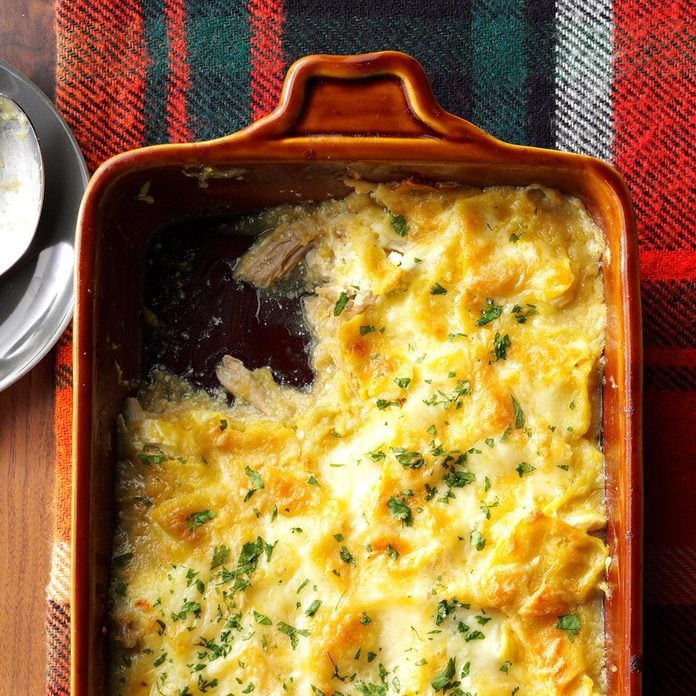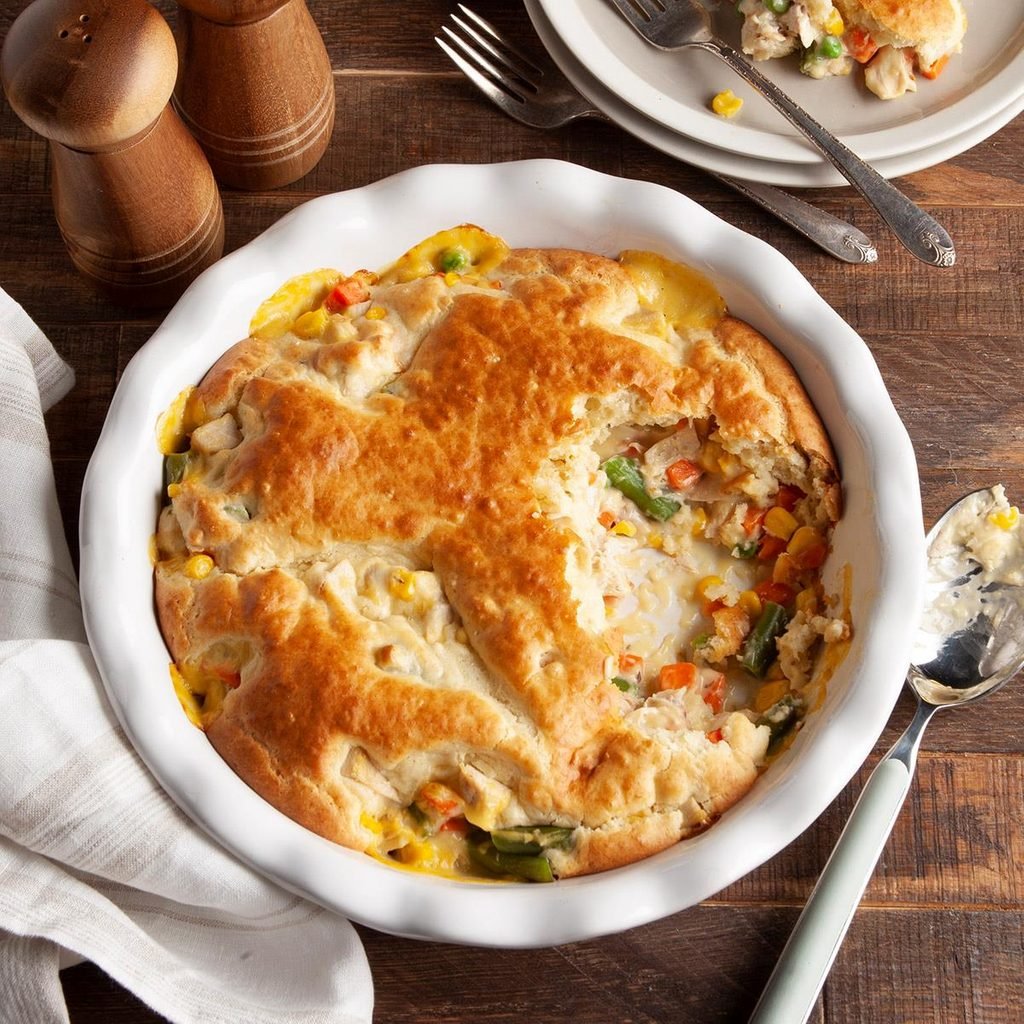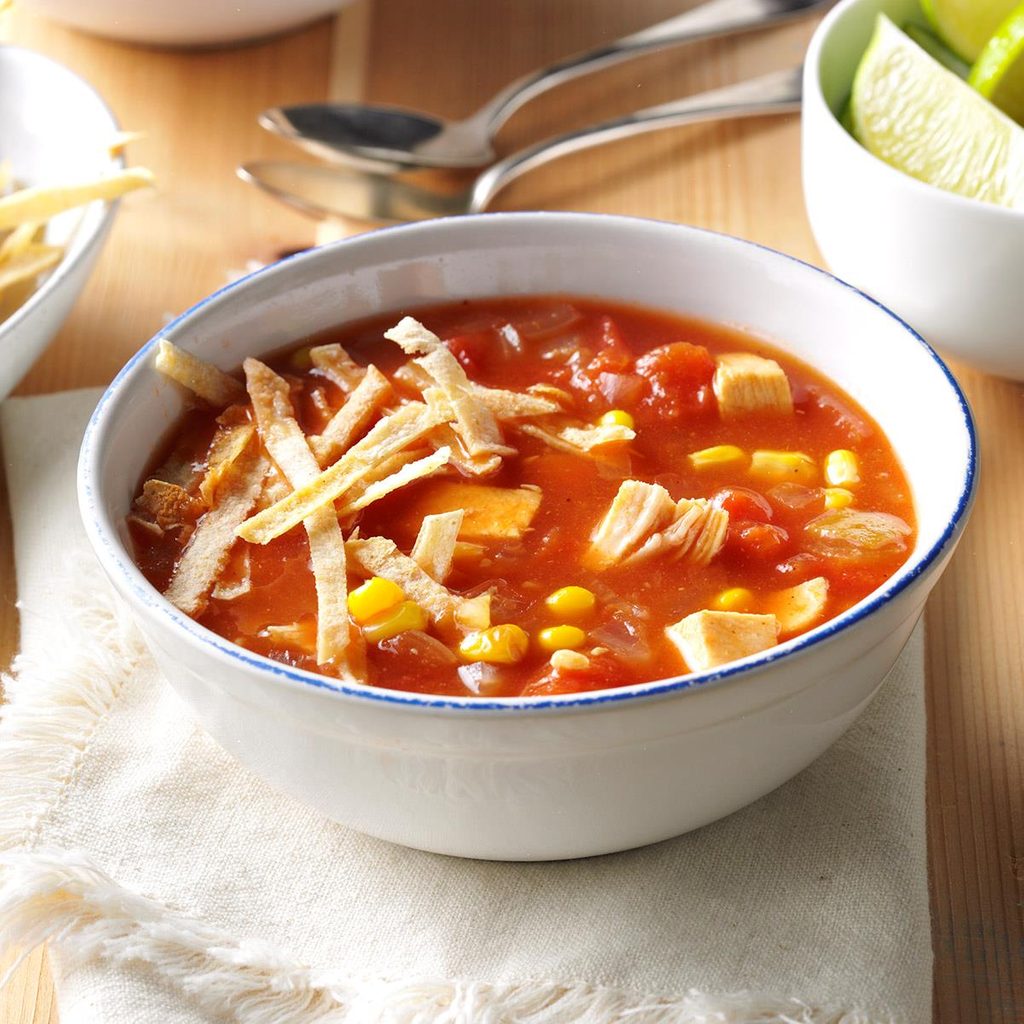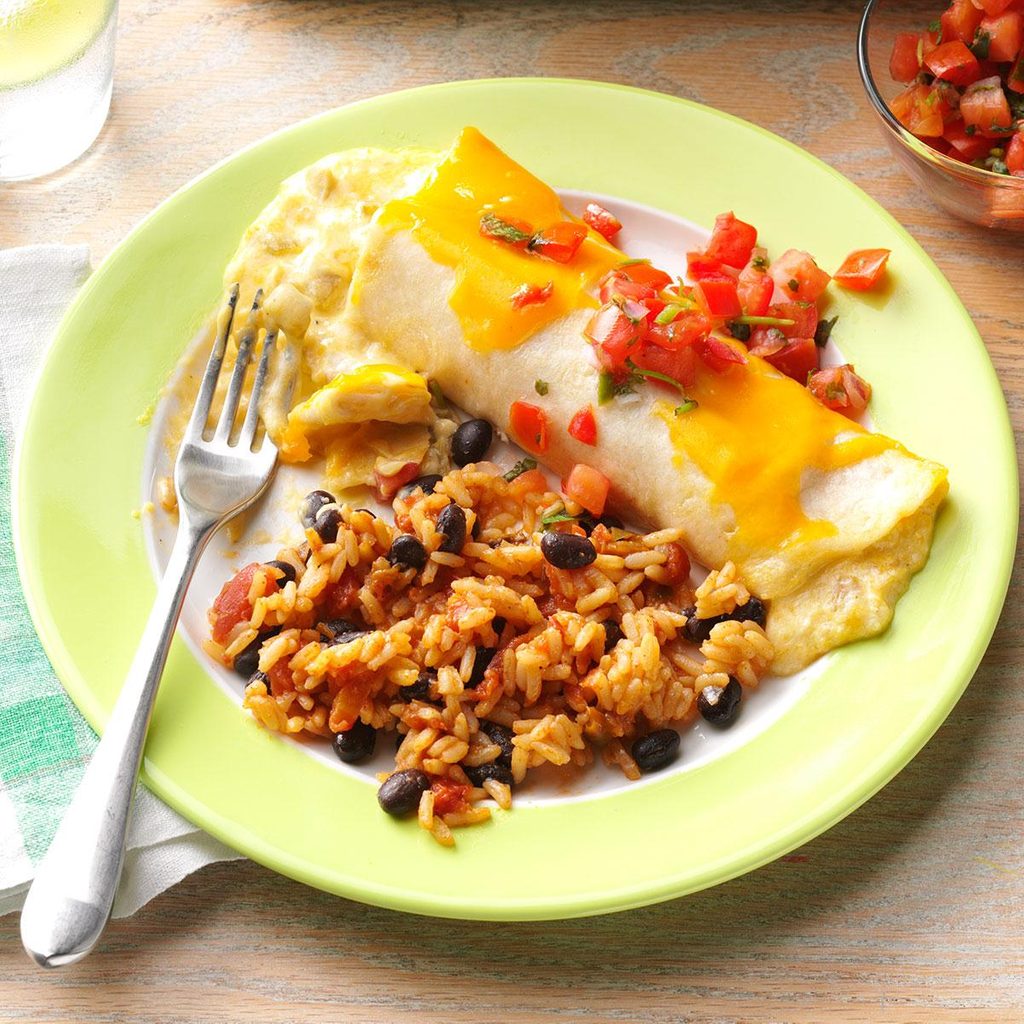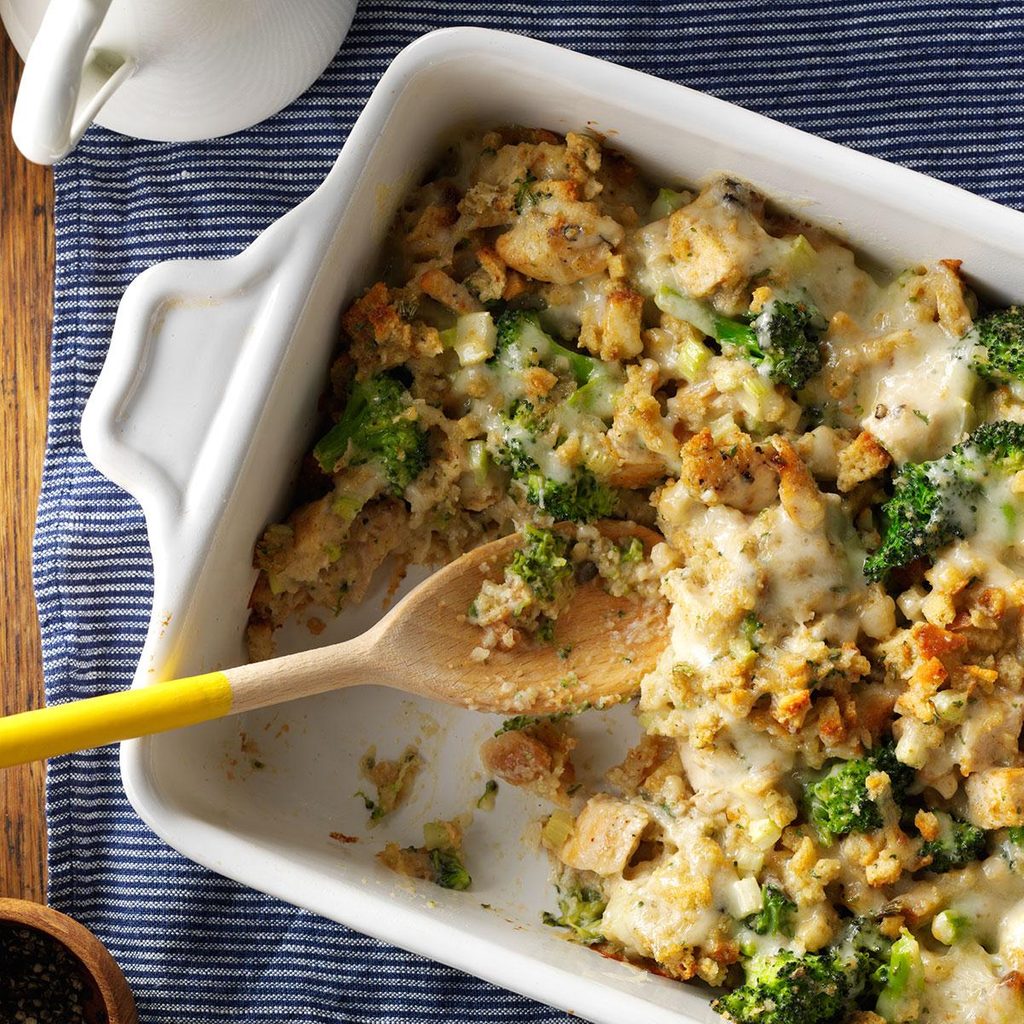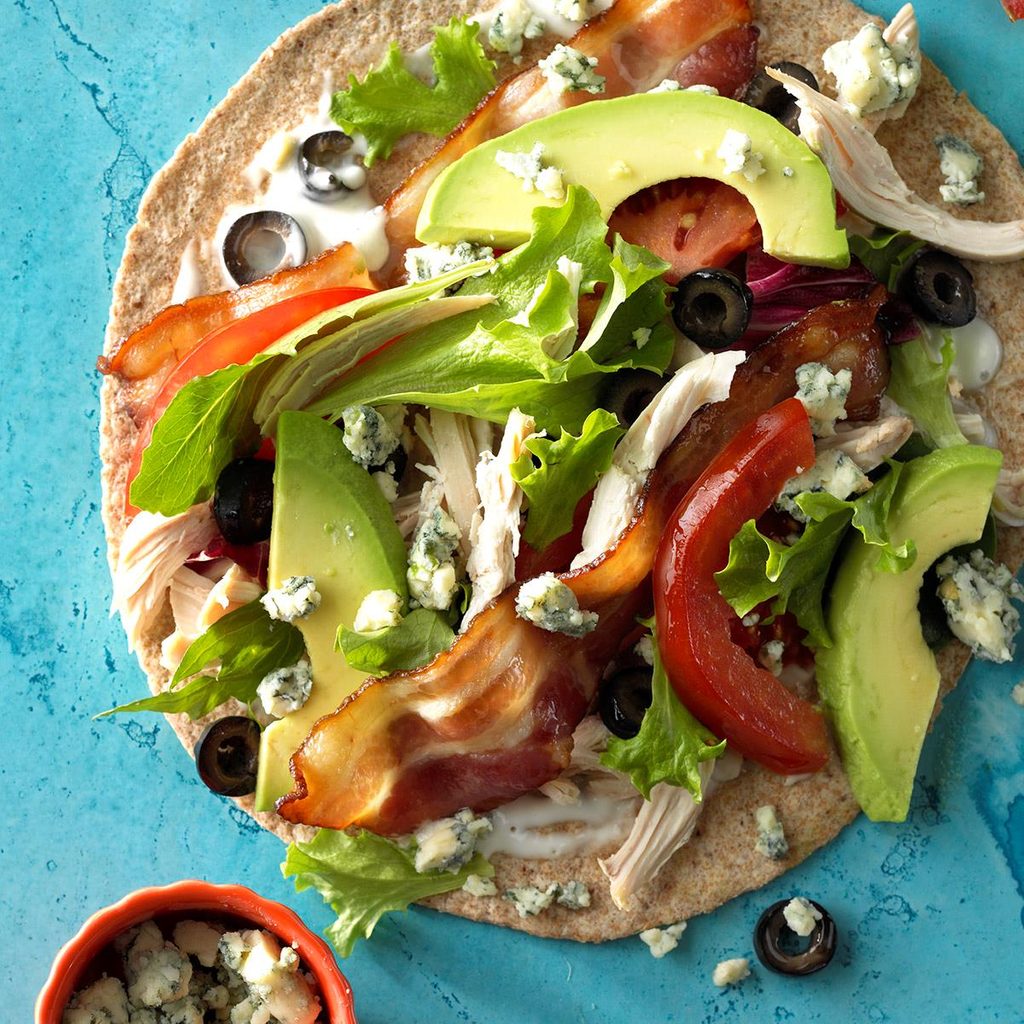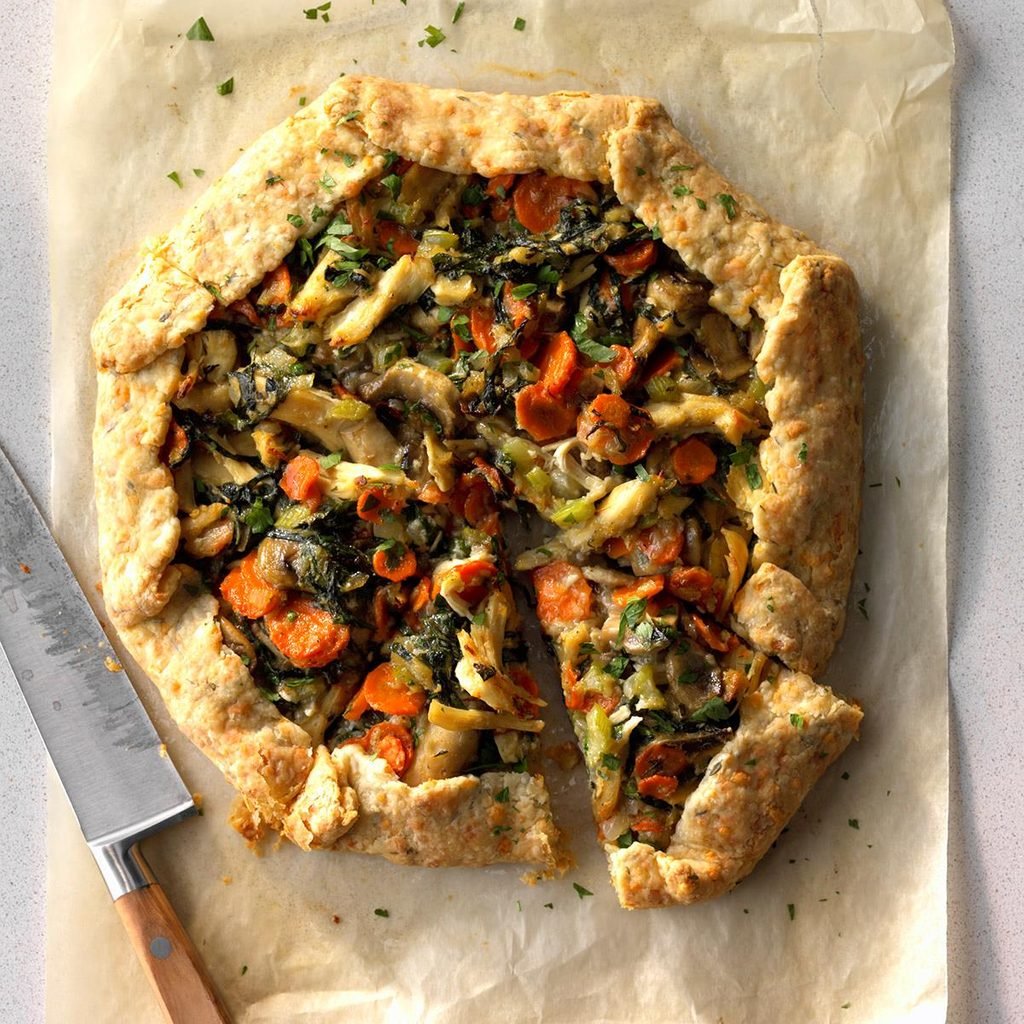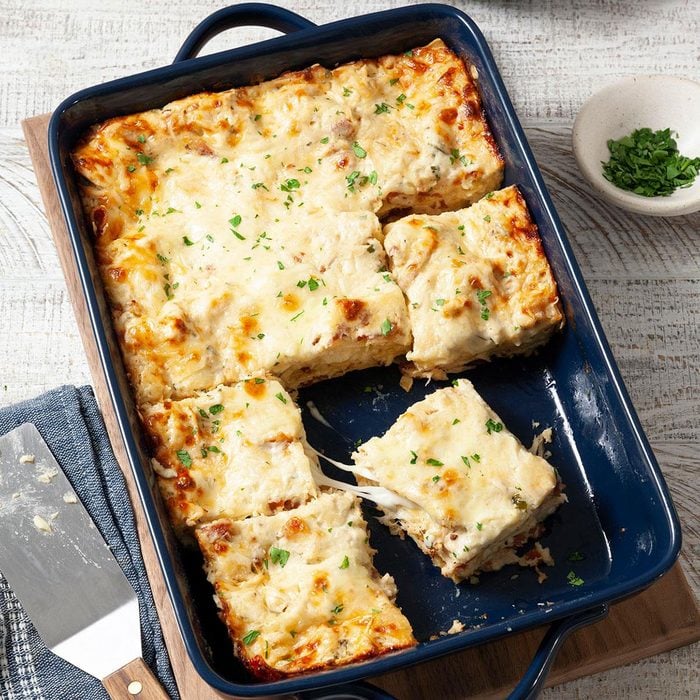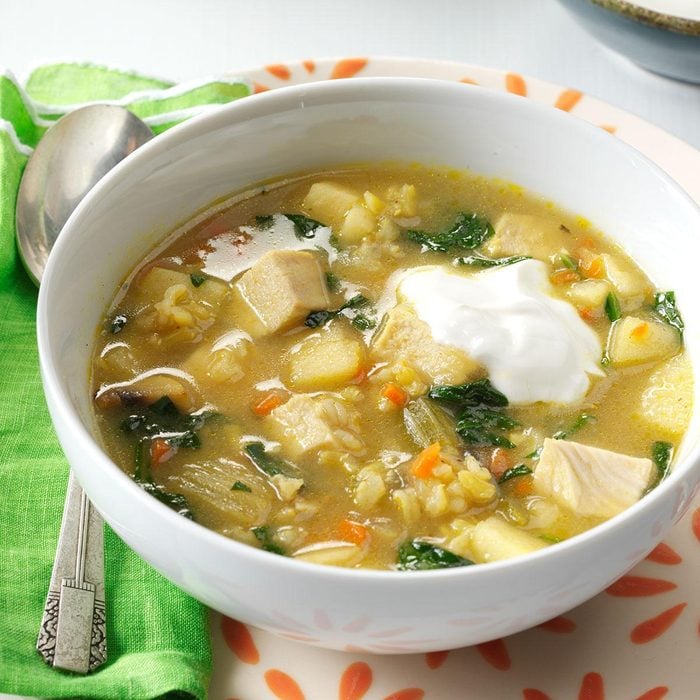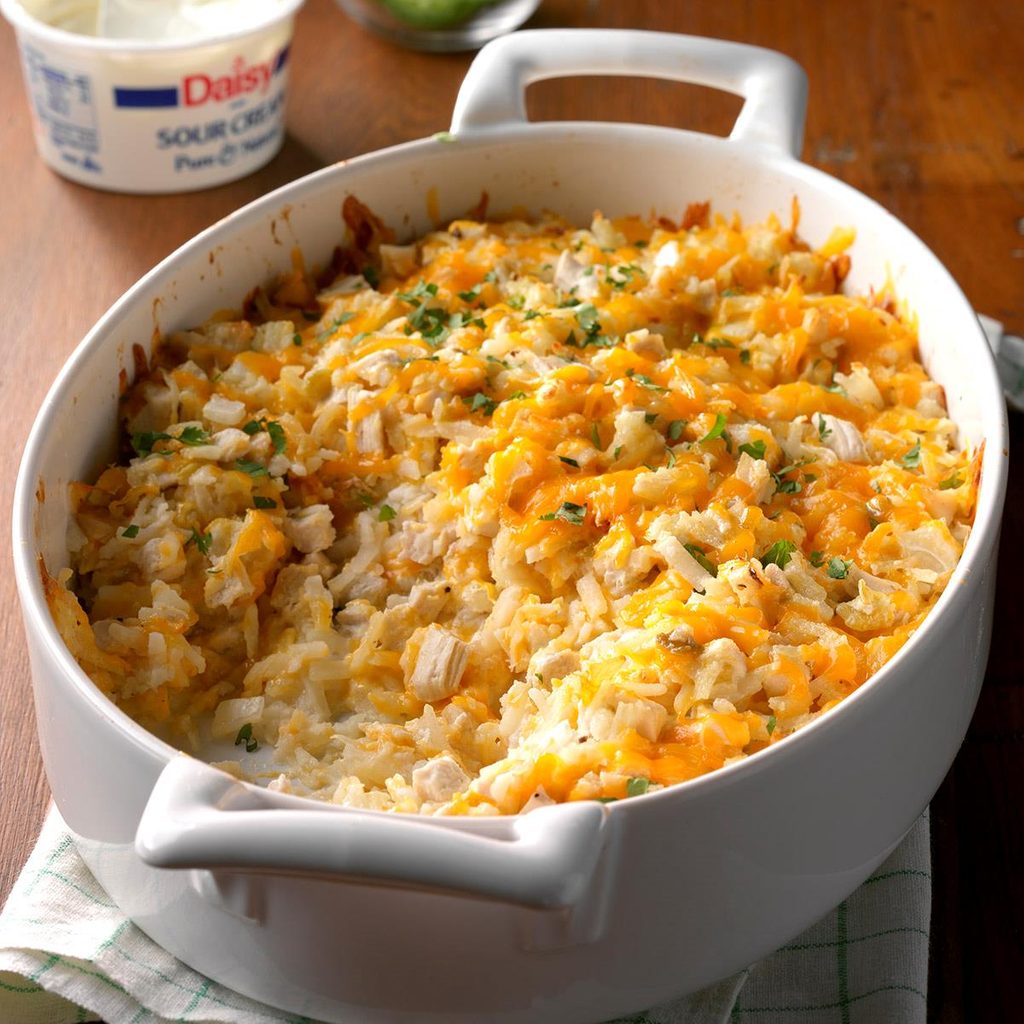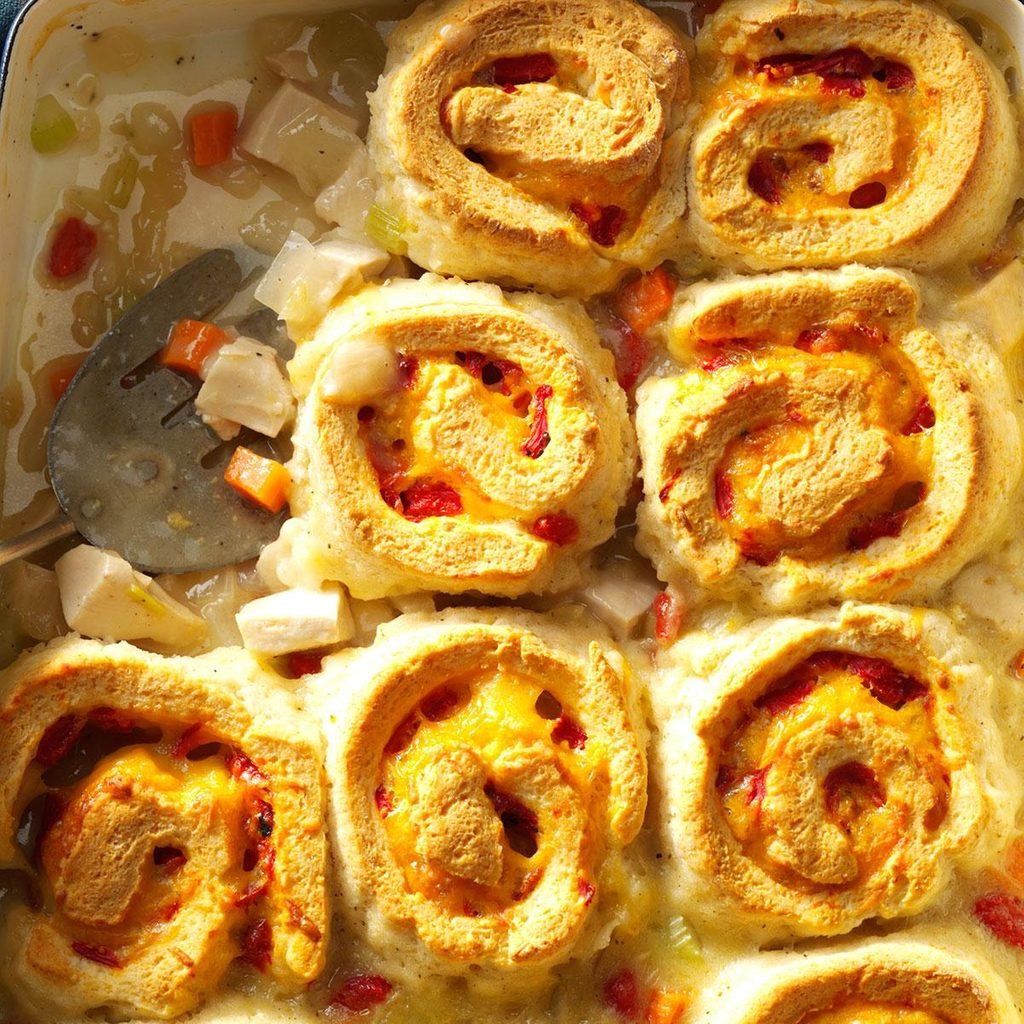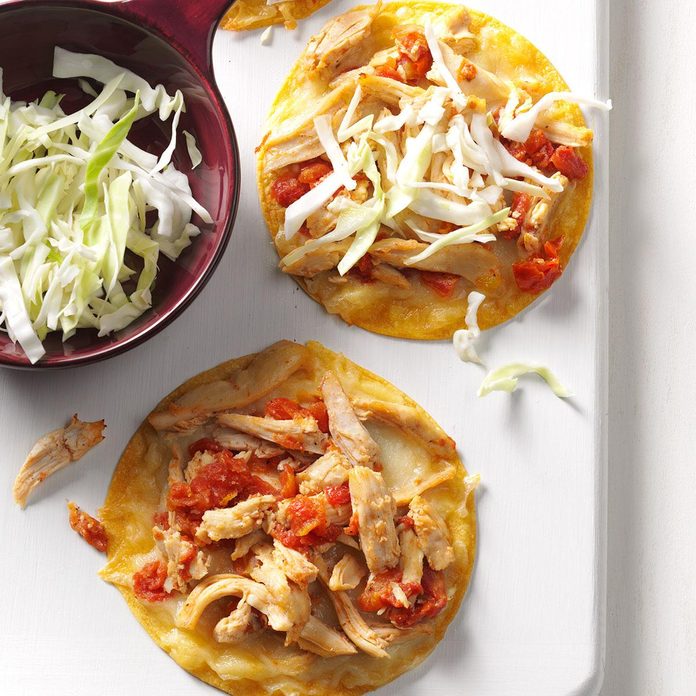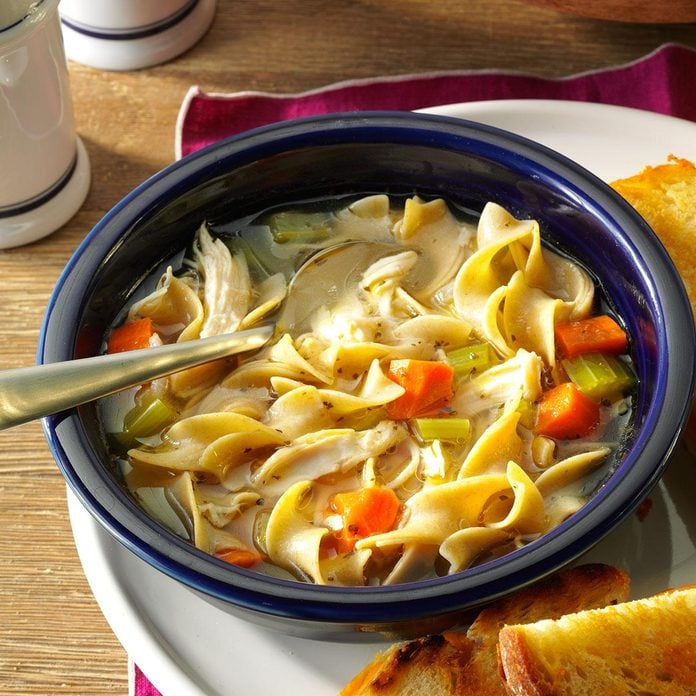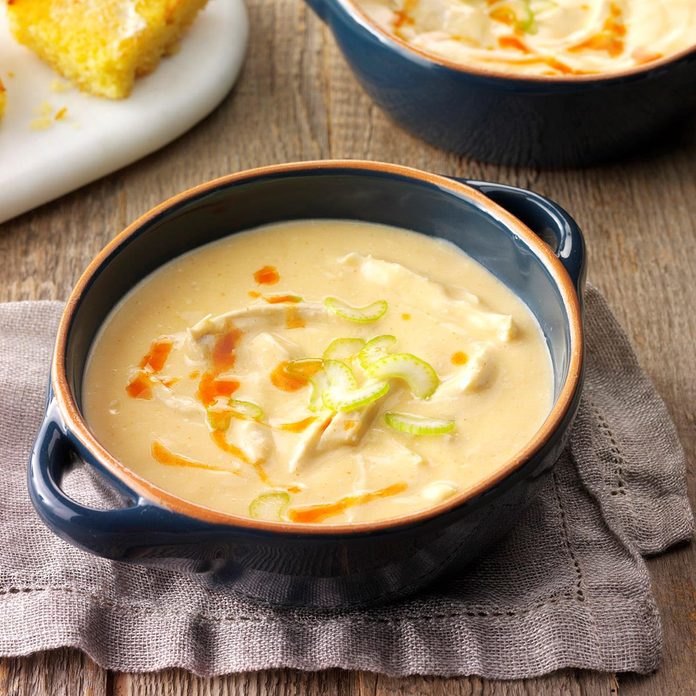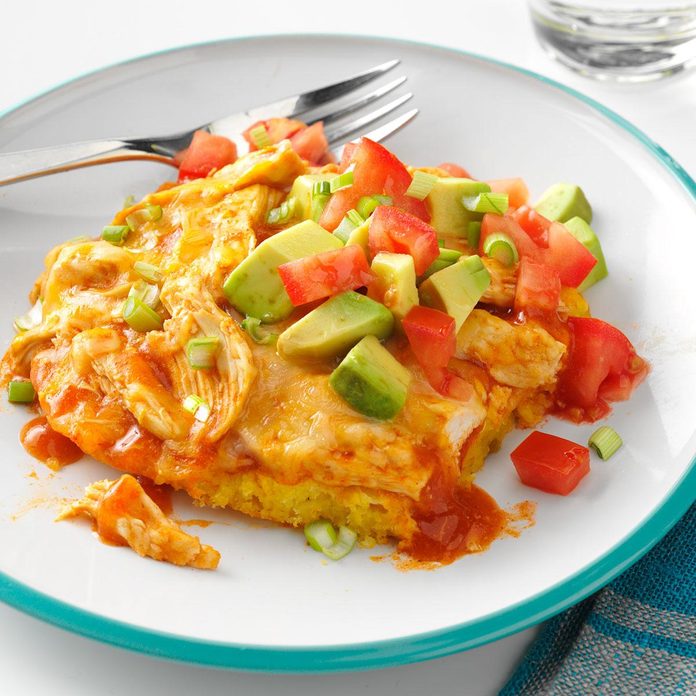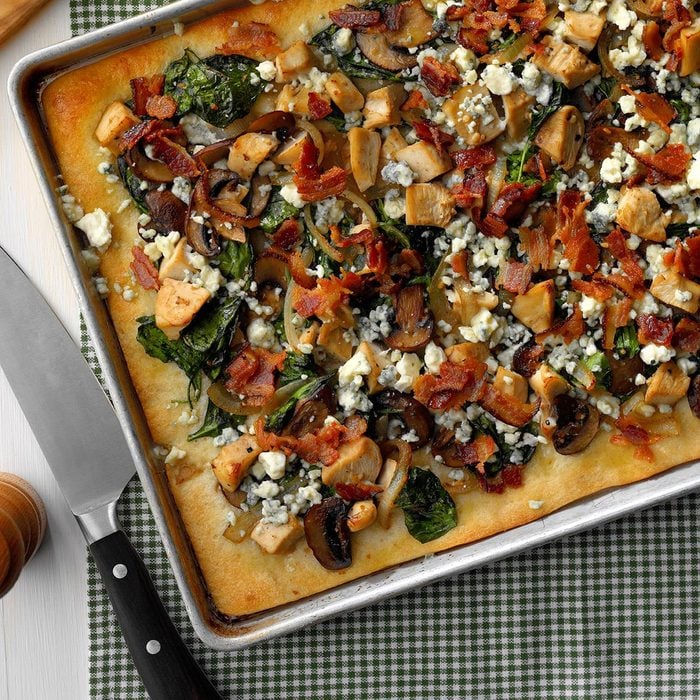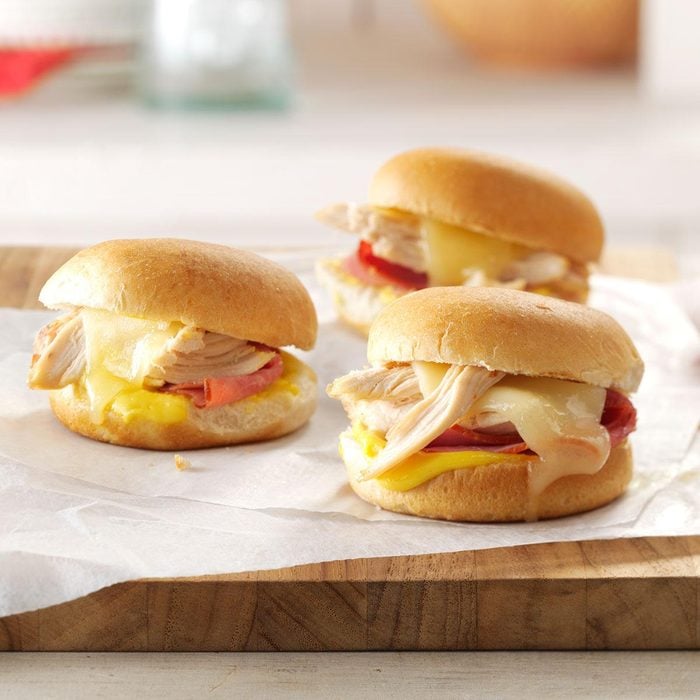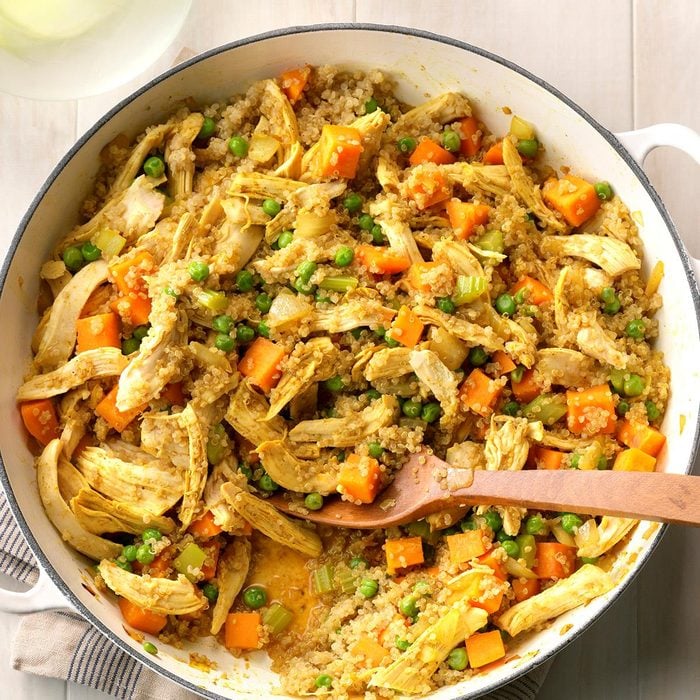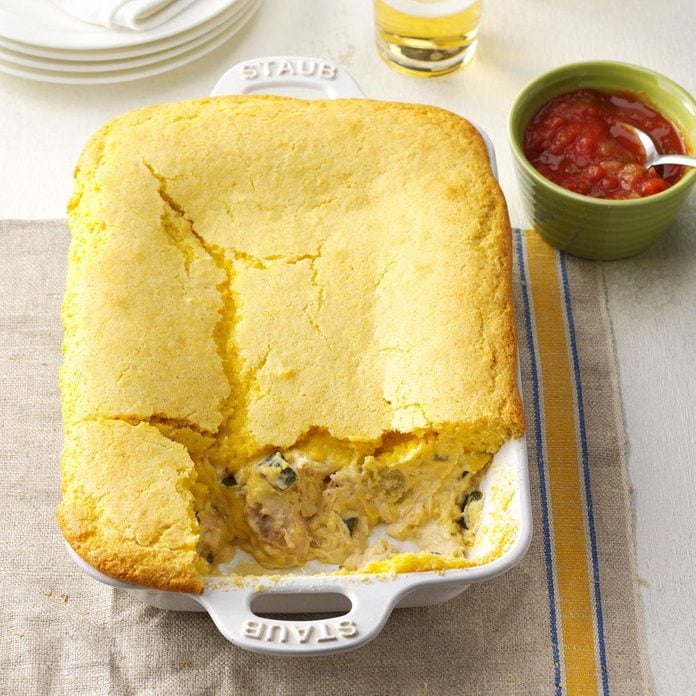These are our favorite ways to use leftover chicken.
Creamy Chicken EnchiladasOne of our most popular chicken dinners ever, these creamy enchiladas are easy to make at home. Layer a
13x9-inch pan with tortillas stuffed with leftover chicken, cream cheese and spices, then pour over a quick enchilada sauce. Feel free to add or subtract chiles, or vegetables like chopped peppers or corn.
BBQ Chicken SandwichesLeftover chicken is a natural fit for sandwiches. These saucy sammies are so easy to toss together, even though they use a homemade sauce (though you can swap in one of our
favorite store-bought BBQ sauces). Serve with a quick side of canned or frozen corn.
Quick Chicken and DumplingsRather than making dumplings from scratch, this recipe calls for a quick substitute: frozen biscuits. The buttery, savory biscuits soften as they soak up the sauce, giving them a squishy, dumpling-like texture (and plenty of flavors).
Spicy Chicken and Bacon MacThis hearty mac and cheese recipe is a cozy dinner on a cool night. Adding cubed chicken and bacon to the creamy noodles transforms the bowl from a kid's menu go-to to a grown-up treat. If you like to have green on the table, serve with a side salad or steamed broccoli.
Chicken Cordon Bleu BakeThis
French-inspired recipe captures all of the flavor of a delicious Cordon Bleu, but transforms it into a big, family-style casserole. A homey, delightful mix of cooked chicken, deli ham, stuffing and cheesy sauce is both delicious and quick to assemble. You can prep the casserole ahead of time and bake at dinner time.
Thai Peanut Chicken CasseroleThis dinner recipe looks so impressive, layered with tasty, nutty sauce, chicken, mushrooms and veggies, but it's incredibly easy to put together. The secret? Using leftover chicken, store-bought sauce and
tubed biscuit dough.
Comforting Chicken Noodle SoupA great recipe to make for new parents (or anyone who needs a
meal train), this chicken noodle soup is a classic. Though it's flavorful and creamy, it only calls for six ingredients plus water.
Chicken, Nectarine and Avocado SaladAdding leftover chicken will turn your
favorite salad into a full dinner. If you're looking for a new recipe, try this one: the juicy, sweet-tart nectarine is a perfect partner to creamy avocado.
Golden Chicken PotpieIsn't chicken potpie the ultimate
comfort food? While a from-scratch pie is a labor of love, this shortcut pie puts the cozy dish on your table easily. Using store-bought pie crust, cubed leftover chicken and frozen hash browns make assembly quick.
Baked Egg RollsThese
takeout-inspired crispy egg rolls are 100% restaurant-worthy, but they're also quick to make in a home kitchen. The crispy shells are packed with fresh vegetables, and chopped leftover chicken gives them enough heft to be a main dish. As a bonus, they're baked, not fried!
Garlicky Chicken PizzaHomemade pizza is surprisingly simple to make, especially if you use store-bought pie dough. Once you start topping your own pies—controlling the amount of sauce, cheese and toppings—you might never go back to delivery. Adding sliced or chopped leftover chicken is a nice protein that matches literally everything.
Chicken Tortilla BakeAs delicious as individual burritos taste, they're time-consuming to wrap one by one. This casserole makes it quick and easy to serve a crowd. Layer tortillas with green chiles, cheese, chicken and creamy sauce, bake and watch your eaters clean the pan.
BBQ Chicken and Apple Bread PuddingThis recipe pulls out all the creative stops! Savory toppings turn bread pudding into a totally acceptable dinner recipe. Swapping
corn muffin mix for plain bread adds tons of flavor. Chicken and BBQ sauce are a hearty filling, while cut-up apples add sweetness and crunch.
General Tso’s StewTossing leftover chicken in a sauce instantly creates a new dinner. While tomato sauce or soy sauce are simple choices, when you're in the mood for something new, try this recipe. Inspired by
General Tso's chicken, the spicy, nutty, sweet sauce is easy to throw together and warm through in the slow cooker. Serve over rice or noodles.
Cherry Chicken CroissantsInstantly elevate chicken salad sandwiches by serving them on croissants. What a treat! Like every good chicken salad recipe, this one combines a variety of flavors and textures: sweet fruits, crunchy nuts and vegetables, and savory bursts of bacon. Of course, you can swap in your favorite toppings, and serve over lettuce for an easy
gluten-free option.
Creamy Slow-Cooker White Chicken ChiliThis
top-rated slow cooker recipe has a secret ingredient: Alfredo sauce. The jarred white sauce adds tons of creaminess, and is mild enough to take on the robust chili seasonings. You can easily make this recipe on the stovetop, too; make sure to simmer long enough for the flavors to develop.
Chicken and Spinach Pasta SaladLooking for a pasta salad that's not too loaded with mayo or oil? Try this light, refreshing option, tossed in a savory, flavorful sauce of Italian dressing and hummus.
Greek-inspired toppings include leftover chicken, spinach, feta and olives, but you can top with any fresh veggies and cheese you like.
Chicken Florentine CasseroleWondering how to get fussy eaters to eat spinach? Transform it into a bright green note in a cheesy, herby chicken casserole. Serve this as a one-dish meal, or double up the greens with a
side salad.
Quick Chicken & Broccoli Stir-FryStir-fry is one of the most versatile cooking methods out there. Starting from a base of aromatics—think garlic, ginger and soy sauce—almost any ingredient can toss into a pot. Meats, chicken, vegetables, nuts and herbs all taste great.
Thai Chicken Peanut NoodlesThis Thai-inspired noodle recipe is extra hearty if you swap whole-grain spaghetti for rice noodles. The quick homemade peanut sauce is easy to adjust to go spicy or mild, and you can add your favorite fresh veggies to the bowl: asparagus, snow peas, edamame or peppers.
Arizona Chicken in Acorn SquashTry this cool trick with your favorite winter squash: scoop out the seeds and fill the hollow with a mix of meat, sauce and vegetables. Bake them all together, and the squash turns into an edible, healthy bowl, while the filling flavors the entire dish. An easy, versatile
weeknight dinner idea.
Zippy Chicken EnchiladasMexican cuisine is one of our favorites, and we especially love
quick recipes for weeknight dinners. This one-dish meal includes refried beans as well as cheese and chicken. Add a bit of texture with chopped olives and green onions, or use chopped cilantro, tomatoes or spoonfuls of salsa.
Cashew-Chicken Rotini SaladThere's no rule that main dishes have to be savory. This pasta salad has a savory base (
Ranch dressing = yum), but it's loaded with sweet notes: canned pineapple, dried cranberries and fresh grapes.
Curried Chicken & Peach SaladWanna know to make a
fresh summer supper in minutes? Top bagged salad greens with jazzed-up leftover chicken. Fresh peaches are a sweet note that compliments the curried chicken salad perfectly, but you can swap in any juicy fruit: tomatoes, nectarines, apples or even berries will work.
Chicken Broccoli ShellsThis pasta dish looks impressive on a plate. But it's so easy to make: fill big pasta shells with diced chicken and broccoli. You can even prepare it ahead of time, and then bake just before guests (or your family) arrive.
Chicken Zucchini CasseroleHave a bumper crop of
zucchini? Chop it up and turn it into a juicy, flavorful filling for this summery casserole. The recipe is so flexible: add other chopped veggies, cooked or raw, or your favorite cheese.
Chicken and DumplingsPsst: you can make chicken soup even more comforting than it already is! How? Top the bowls with puffy, buttery dumplings. This recipe calls for a biscuit mix to make them extra simple to make.
Chicken Noodle CasseroleCozy chicken noodle soup meets cozy chicken casserole in this ultimate
comforting dish. It's creamy with cheesy sauce, crispy with chopped veggies and filling with leftover chicken.
Chicken DivanThis top-rated recipe starts with a homemade cream sauce, thickened the old-fashioned way, with a
roux. The final dish is especially creamy and unctuous thanks to this easy (we promise!) step.
Chicken BurritosCooking for a hungry crowd? Bookmark this hearty dinner recipe. Cheesy, spicy burritos are filled with both beans and chili, making them ideal for growing
teens.
Chicken & Cheese Noodle BakeRead the recipe closely: this one makes two entire casseroles! Eat one for dinner tonight and freeze the other, or bring both to a
potluck.
Chicken Enchilada BakeEnchiladas are some of our most popular chicken recipes, and it's easy to see why. They're oh-so-easy to make, and please every eater in the family. This one uses corn tortillas, making it an easy
gluten-free dinner.
Chicken Biscuit PotpieThere's nothing more homey than pulling a bubbling casserole dish from the oven! Even busy cooks can capture the feeling: this potpie takes just 10 minutes to throw together before you pop it into the oven. You can even assemble it ahead of time and slide it in the oven when you get home from work.
Spicy Chicken Tomato SoupWant the equation for the easiest dinner ever? Combine leftover chicken with a good
slow-cooker soup recipe. This flavorful, spicy soup calls for frozen and canned vegetables.
Chicken Enchiladas with Cream of Chicken SoupYou'll need a fork and a big plate to eat these cheesy, gooey enchiladas. Serve them with a good
store-bought salsa on the side.
Chicken and Swiss Stuffing BakeIf you're only eating stuffing on Thanksgiving, you're missing out! The savory, crumbling bread dish makes a hearty casserole filling. Here, broccoli, chicken, cream of mushroom soup and Swiss cheese layer into a flavorful one-bowl dinner.
Cobb Salad Wrap SandwichesWant the
easiest sandwich ever? Simply slice leftover chicken into a yummy wrap. Cobb salad fixings—blue cheese dressing, avocado and bacon—are a natural pairing for chicken.
Chicken Potpie Galette with Cheddar-Thyme CrustAlthough it relies on leftover chicken for filling, this galette is a delicious meal special enough for an occasion. The from-scratch crust gets an extra savory kick from cheddar cheese, and the filling is rich with mushrooms, chard and chicken.
Chicken Alfredo LasagnaTwo favorite
pasta dishes unite in this scrumptious casserole. Alfredo sauce, chicken, ham and cheese layer between noodles.
Brown Rice MulligatawnyWant a twist on classic chicken soup? Try this mulligatawny, an Indian-inspired soup packed with vegetables and lightly seasoned with curry spices. Brown rice makes for a healthy whole grain filling.
Chicken and Chiles CasseroleCasseroles are the easiest one-dish meals. This creamy, cozy, slightly spicy dinner is filling and flavorful, and you can even make it ahead.
Chicken & Cheddar Biscuit CasseroleLots of great recipes start with a box of
Bisquick mix. This delightful casserole combines the flavors of a good roast chicken dinner—peppers, sauce and buttery biscuits—but makes it all in one pan.
Baked Chicken ChalupasOne of our favorite Mexican-inspired dishes, chalupas are usually deep-fried and rich. This recipe simplifies them for the home cook: baking instead of frying, but not giving up a bit of flavor.
Cold-Day Chicken Noodle SoupThis has to be the best recipe to
eat when you have a cold. As a bonus, it's easy enough to make even when you are feeling a bit under the weather (though it's even smarter to make a big pot and keep it in the freezer).
Buffalo Chicken Wing SoupAdd leftover chicken to any
soup recipe, and you'll have a fresh bowl in a hurry. This soup transforms plain
rotisserie chicken leftovers into a creamy, kicky soup inspired by chicken wings.
Chicken Tamale BakeThis ooey-gooey casserole dish is comfort food the whole family can enjoy. Serve with
guacamole and chips for a festive Friday night dinner.
Chicken & Blue Cheese PizzaThis pizza breaks the convention that tomato sauce and mozzarella are requirements. Using olive oil as a base lets the flavors of the toppings shine, while blue cheese packs in savory flavor.
Swiss Chicken SlidersThere's something about sliders that feels so fun, even though they're as easy to make as any sandwich. Load buns with ham, sliced chicken, and Swiss, then bake in a casserole dish until the cheese is melty. Fun for a
party or a family dinner!
Curried Chicken SkilletThis quick curry skillet puts a superfood at its base:
quinoa. The protein-packed grain is naturally gluten-free and full of fiber, and it's quick to cook, too. Making a quick curry seasoning ties the whole dish together.
Chicken Chiles Rellenos CasseroleA ceiling of savory, tender corn bread blankets this cheesy, spicy chicken casserole. Make this dish on the coldest
winter night, and you'll instantly feel oh-so-cozy.
